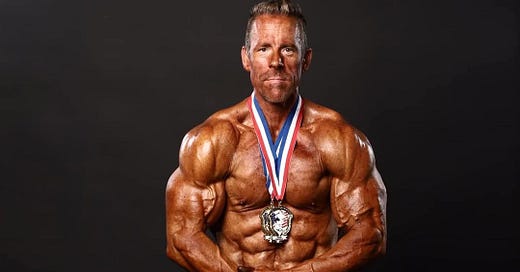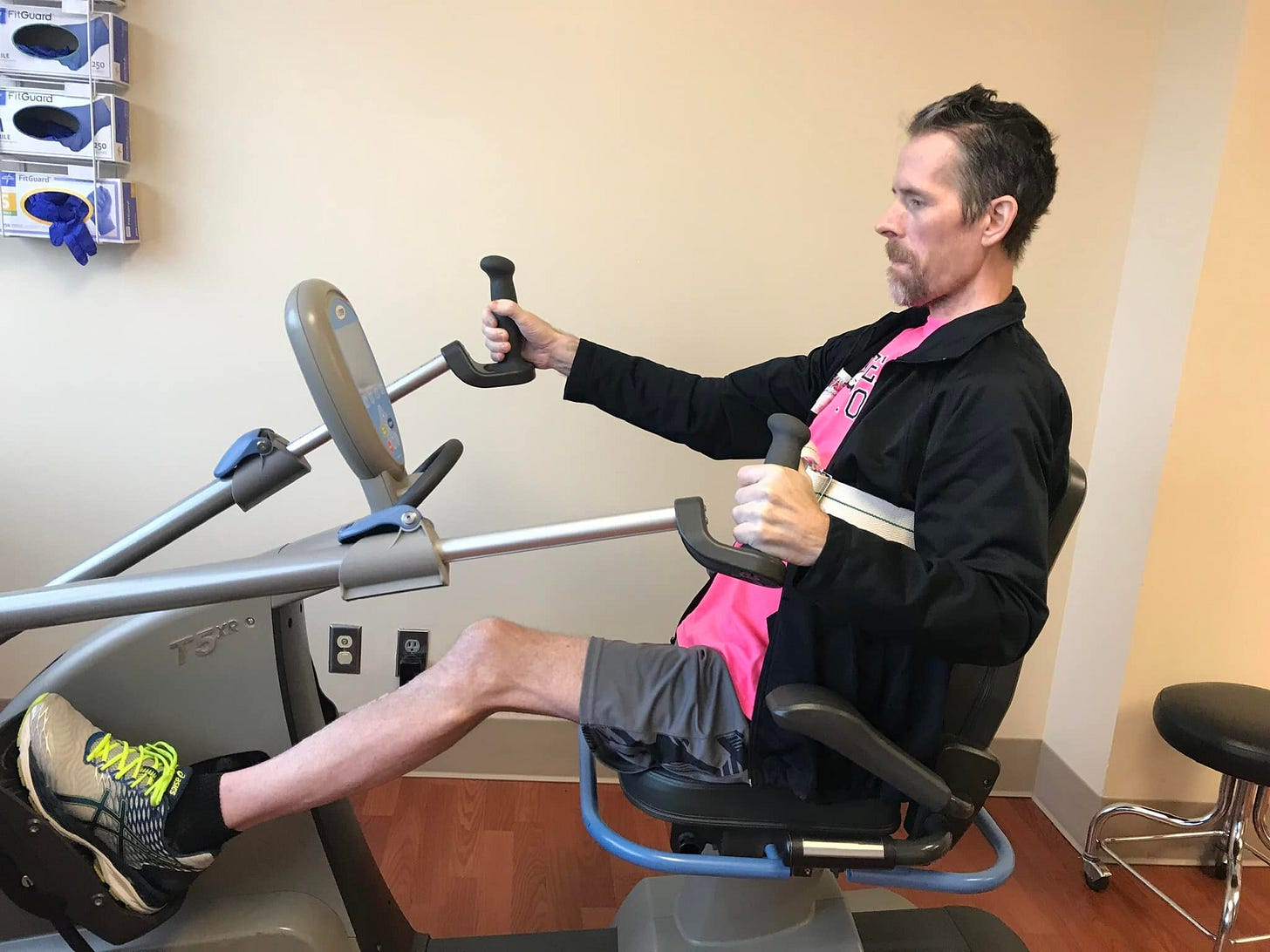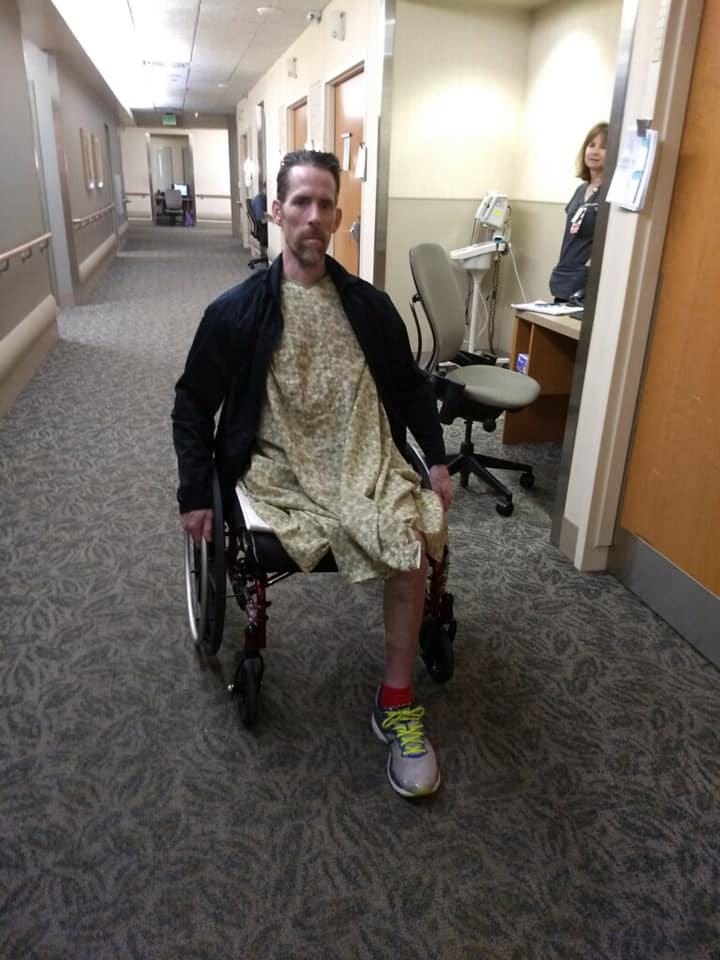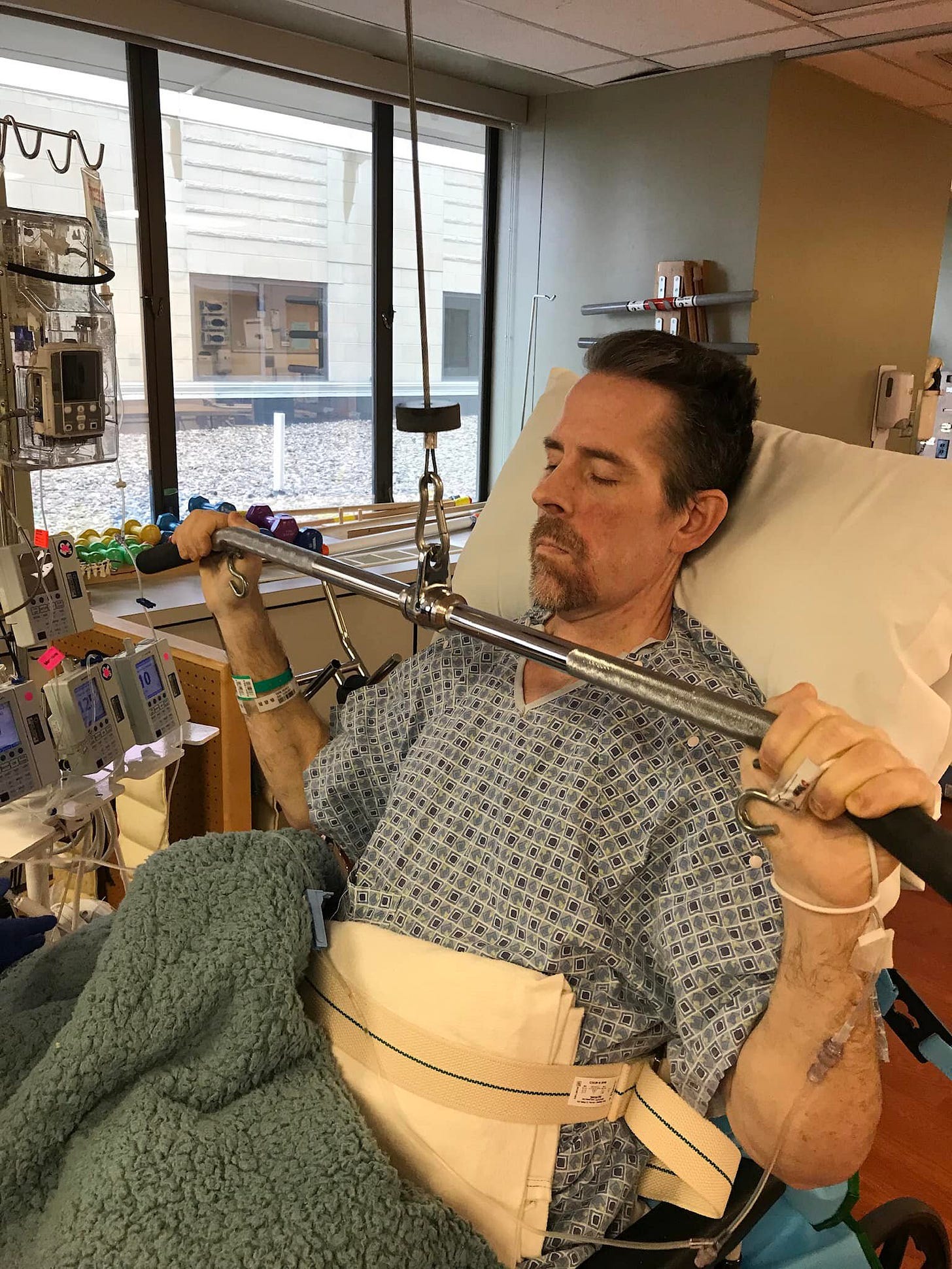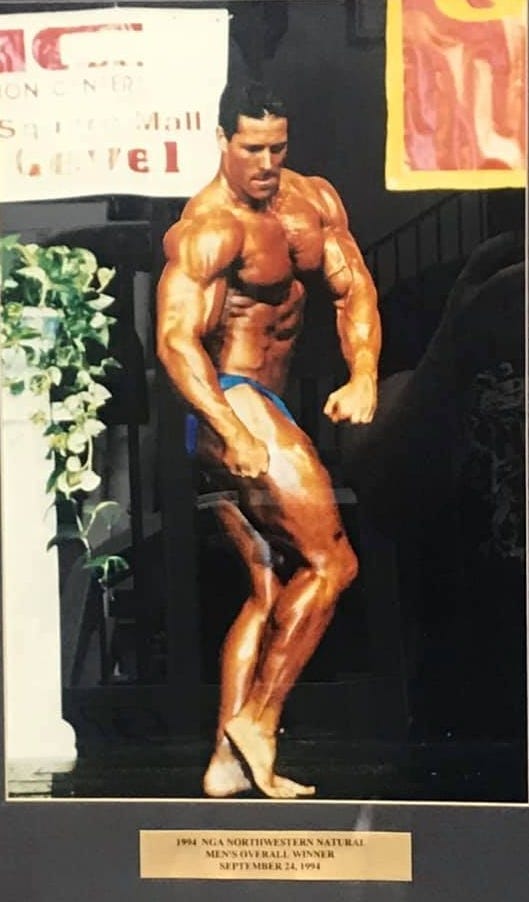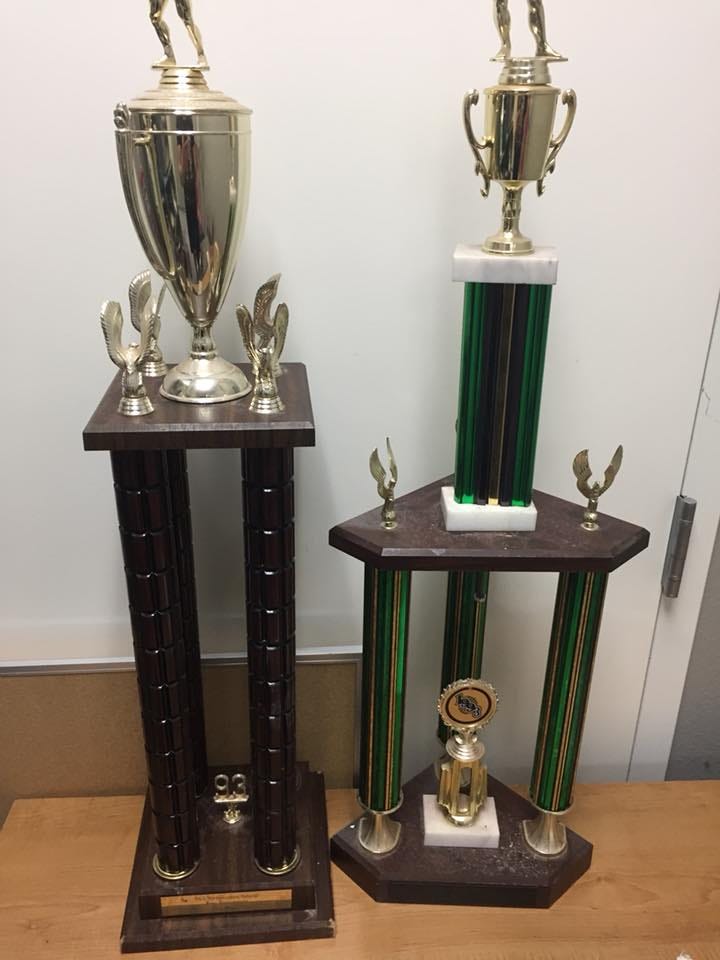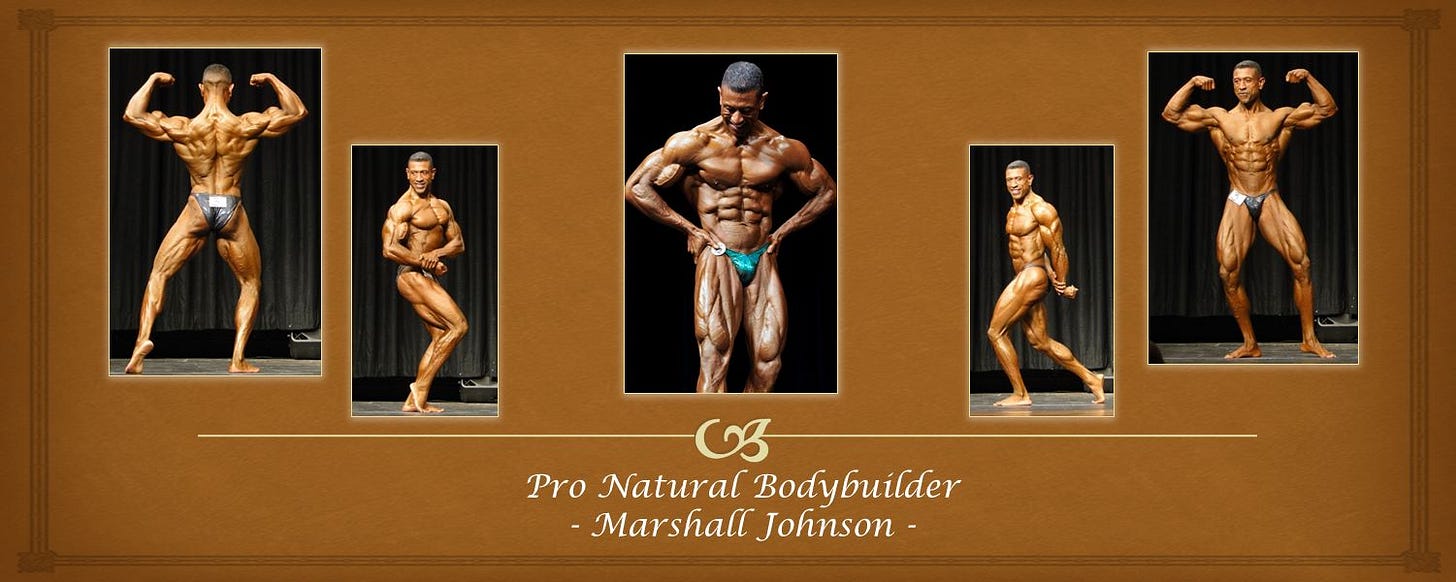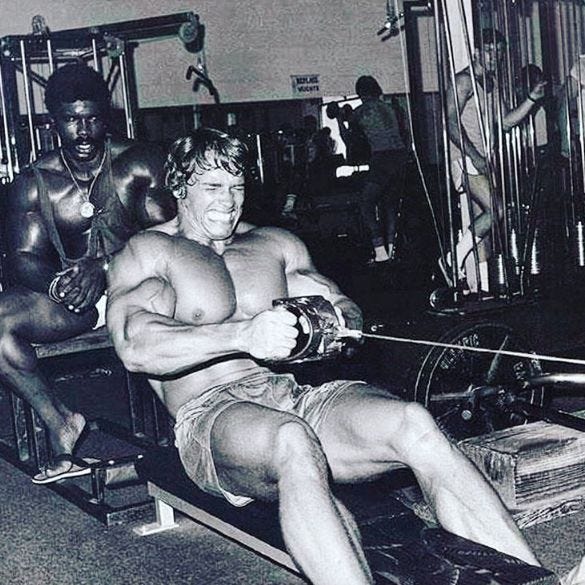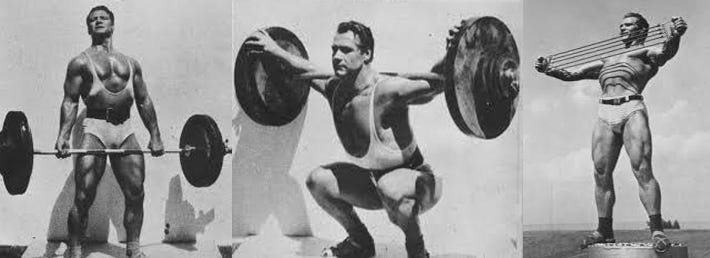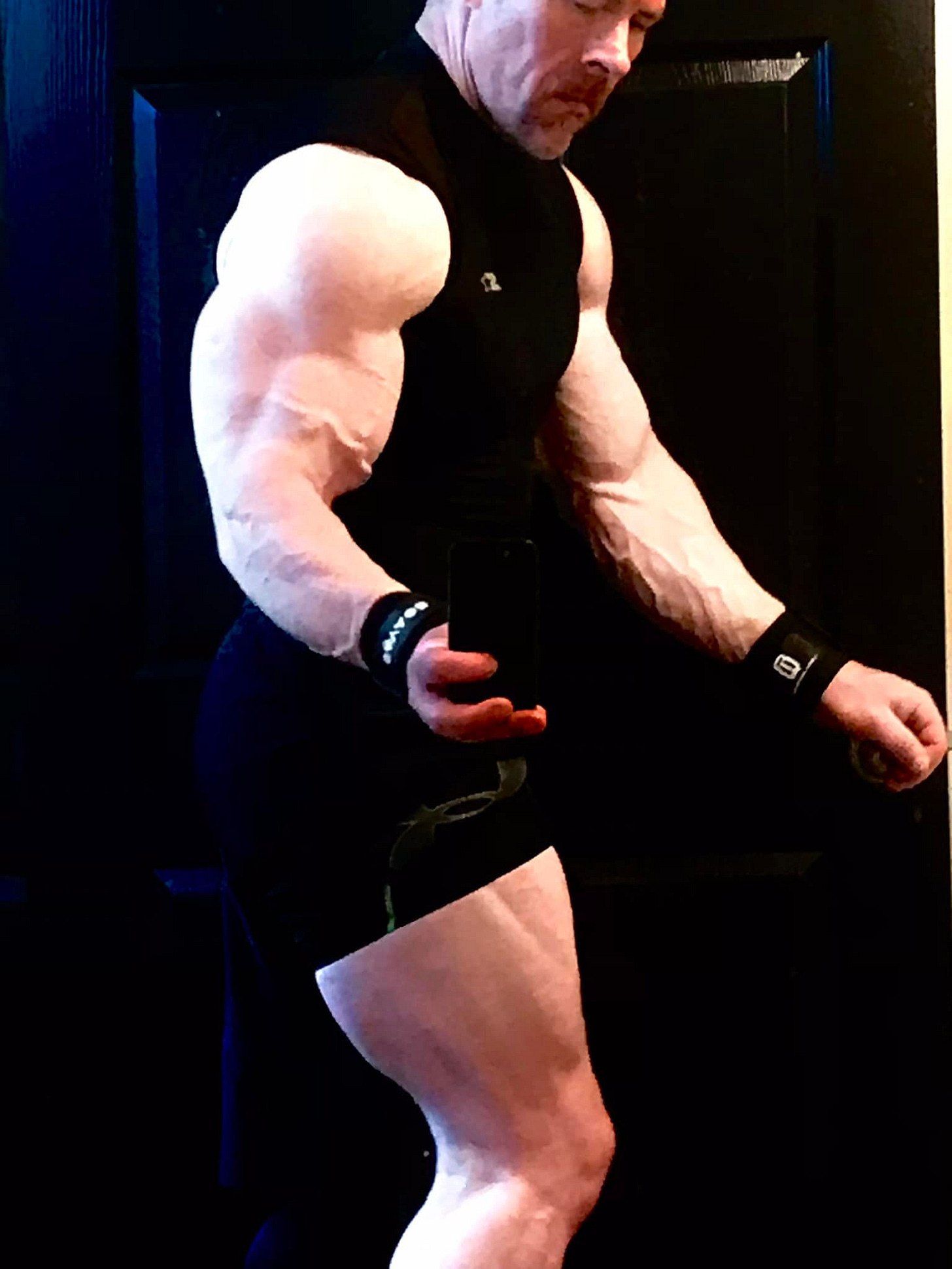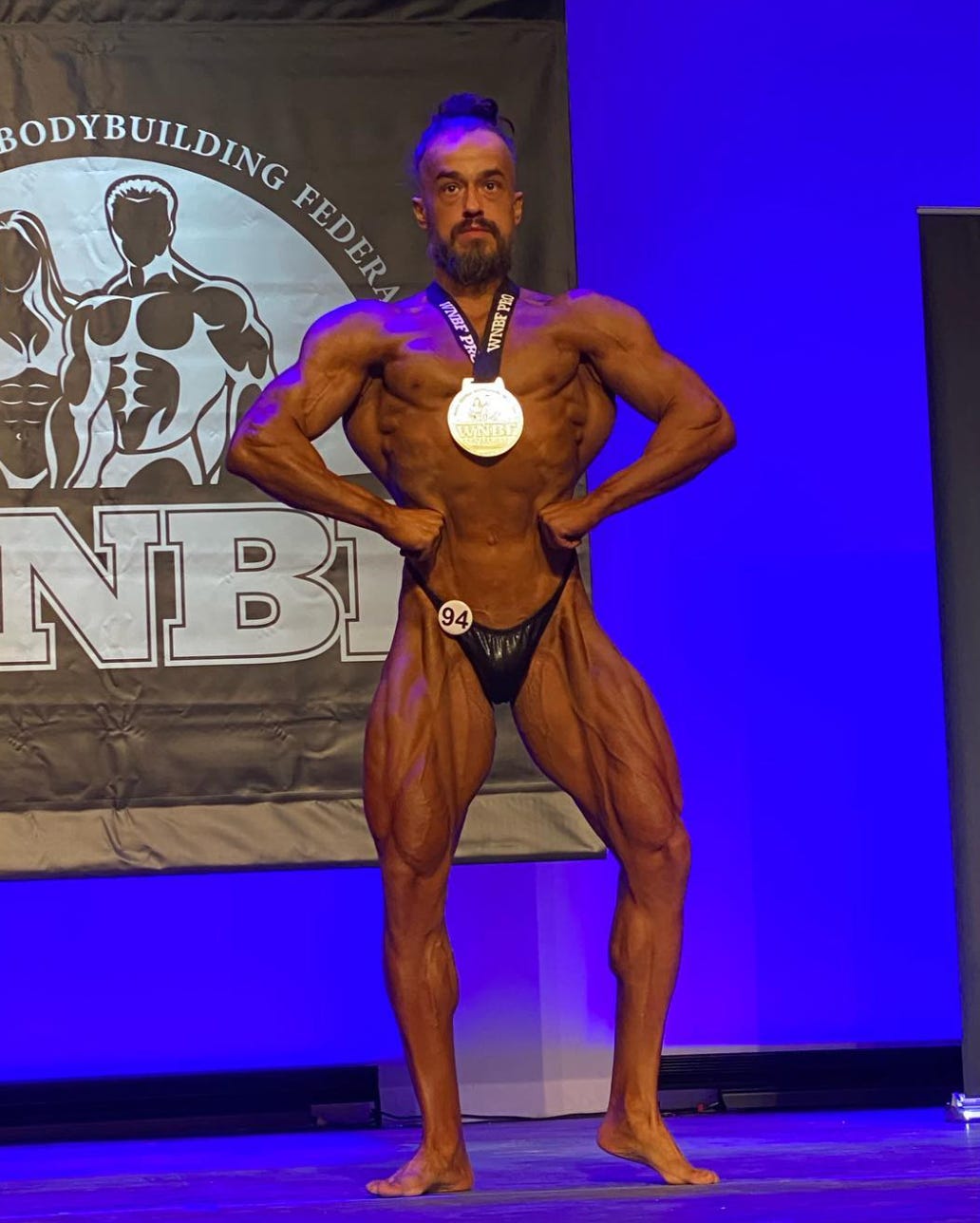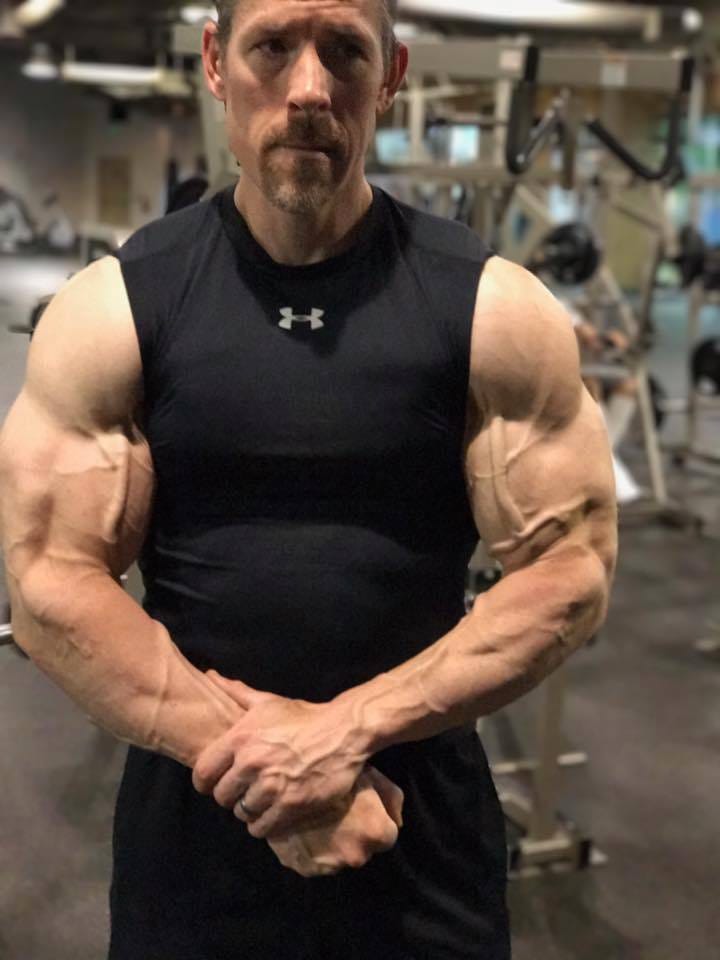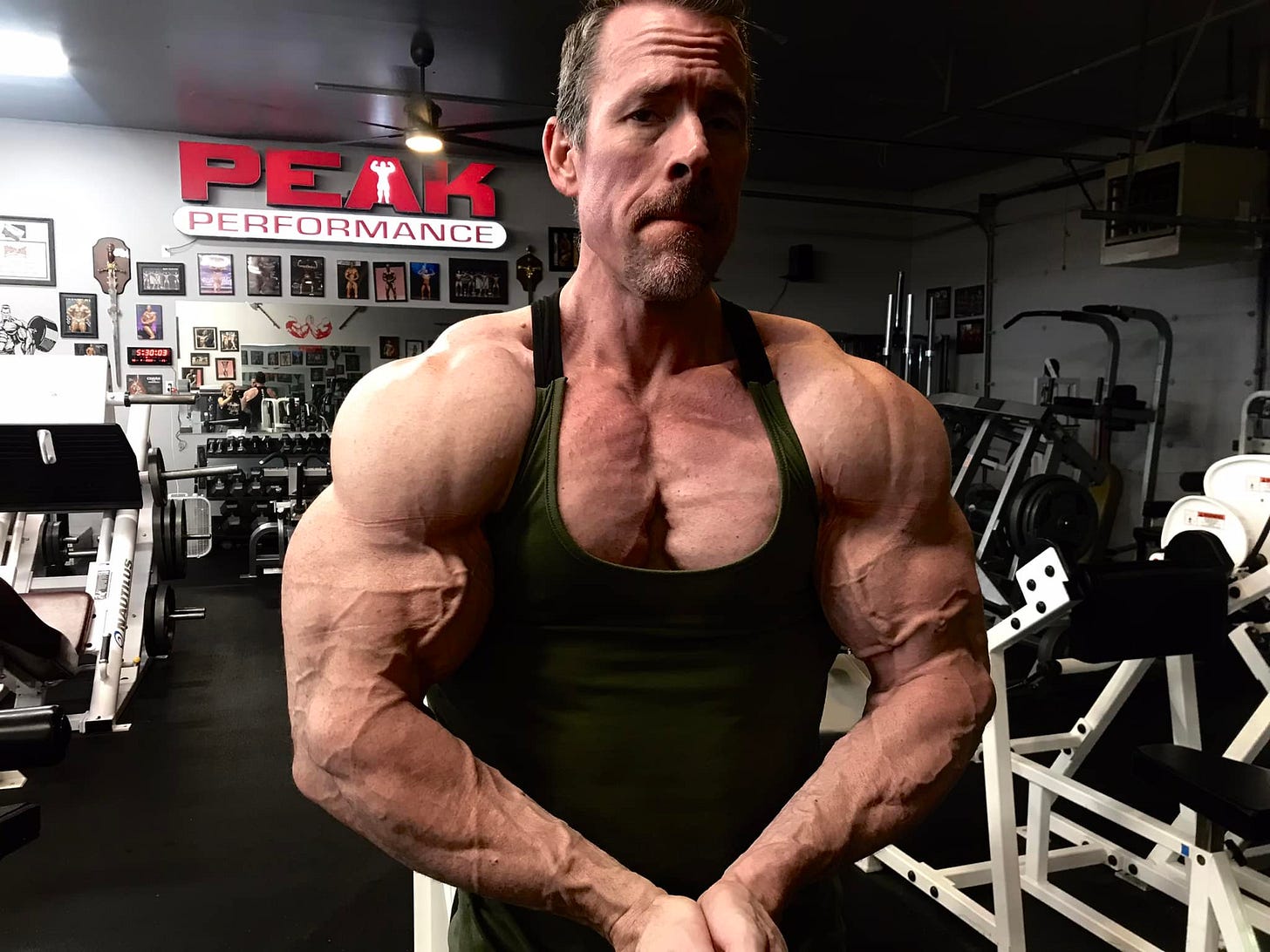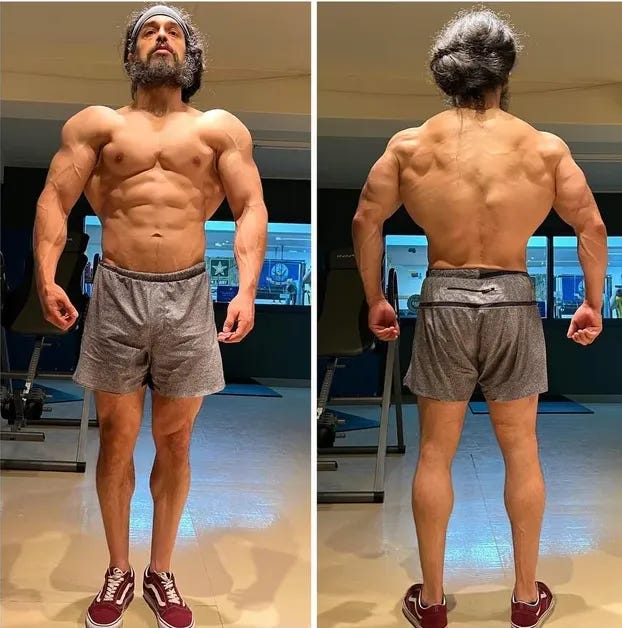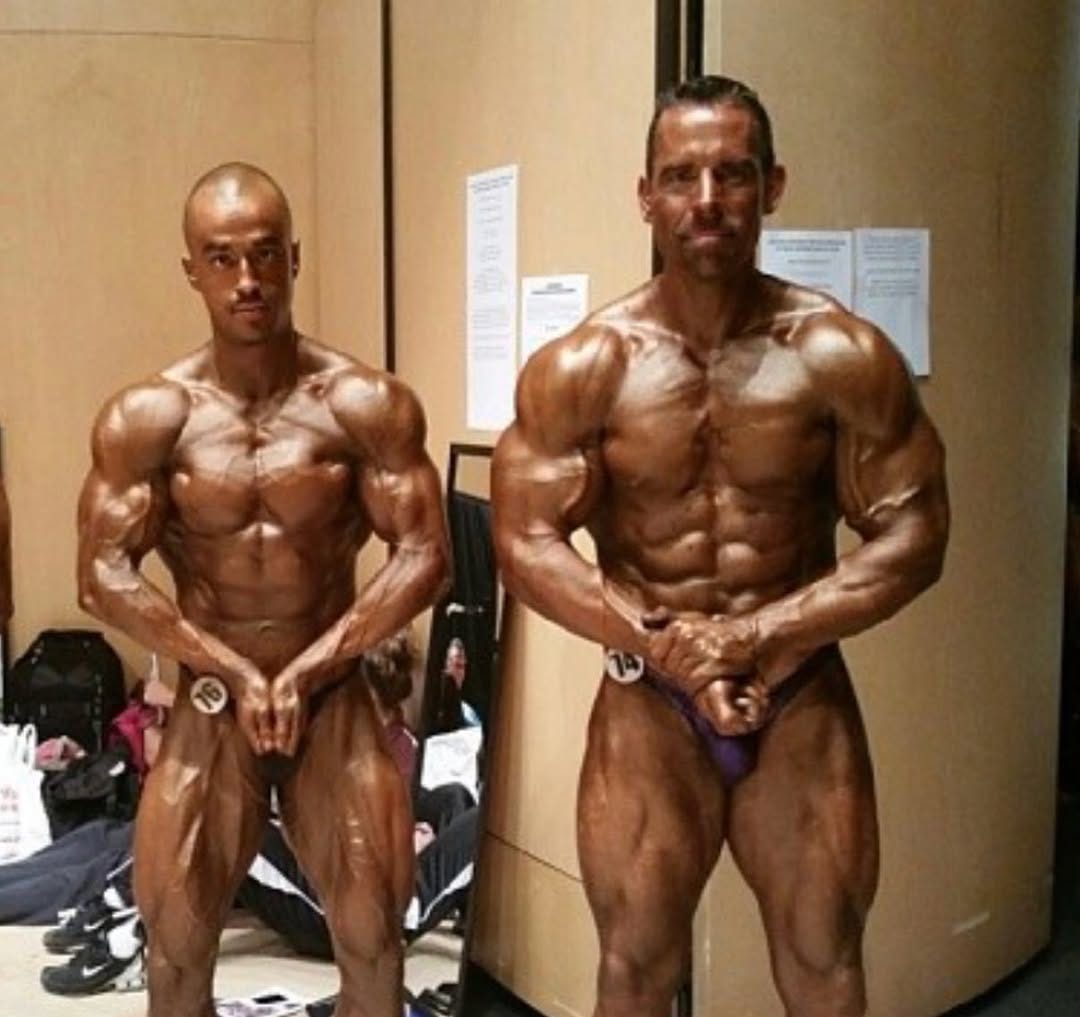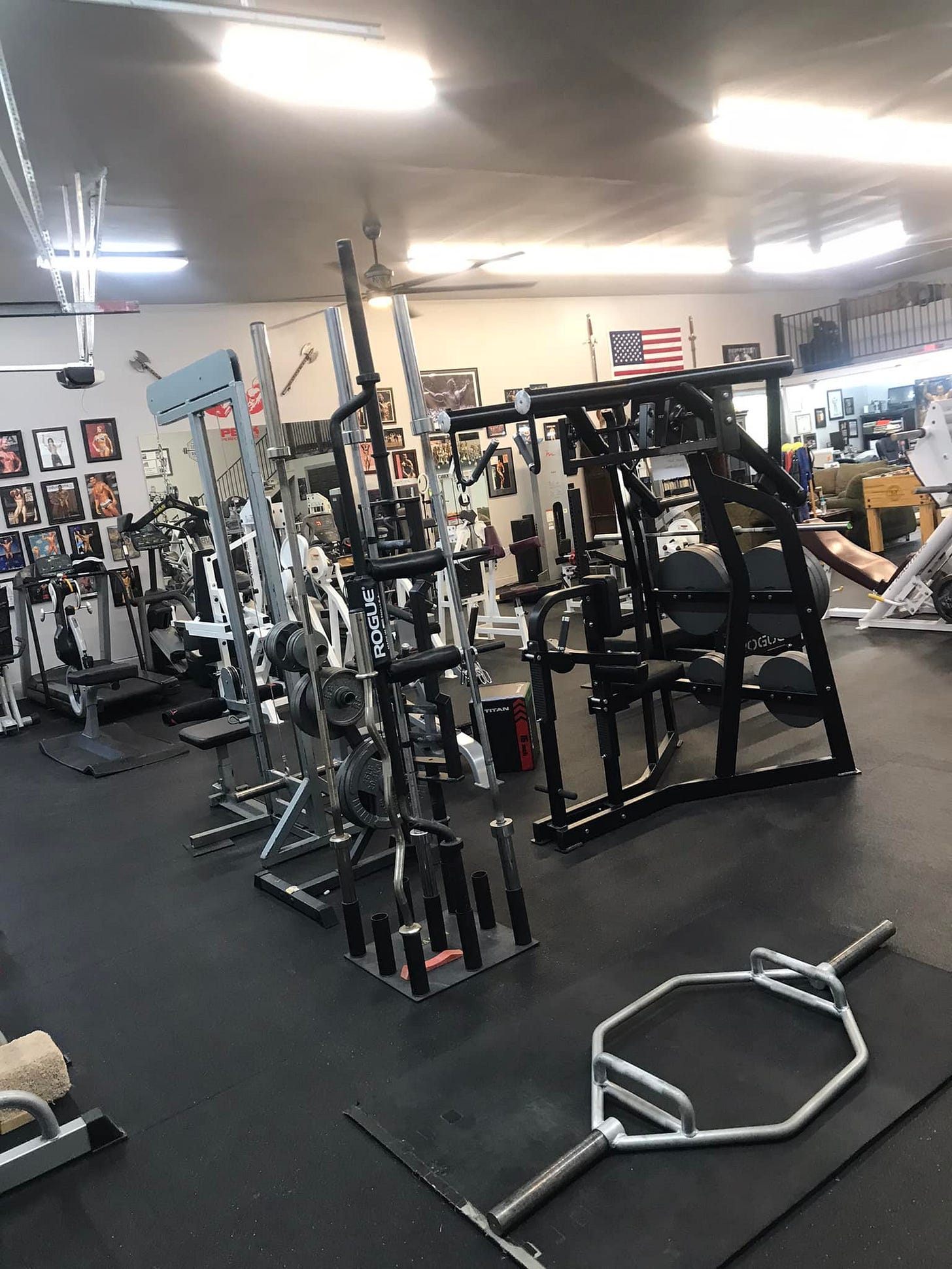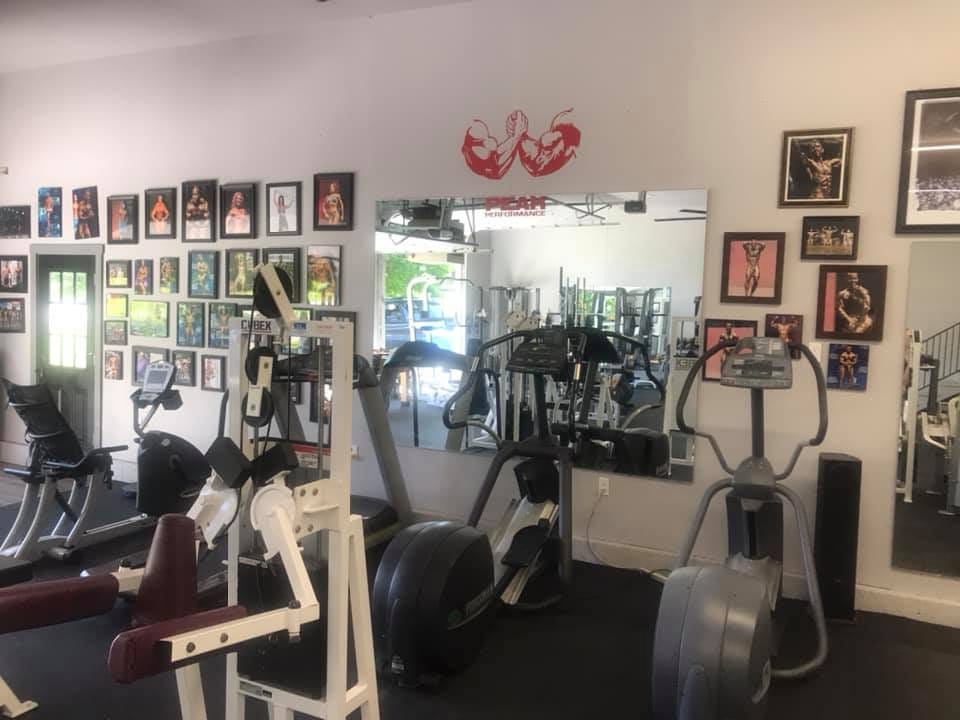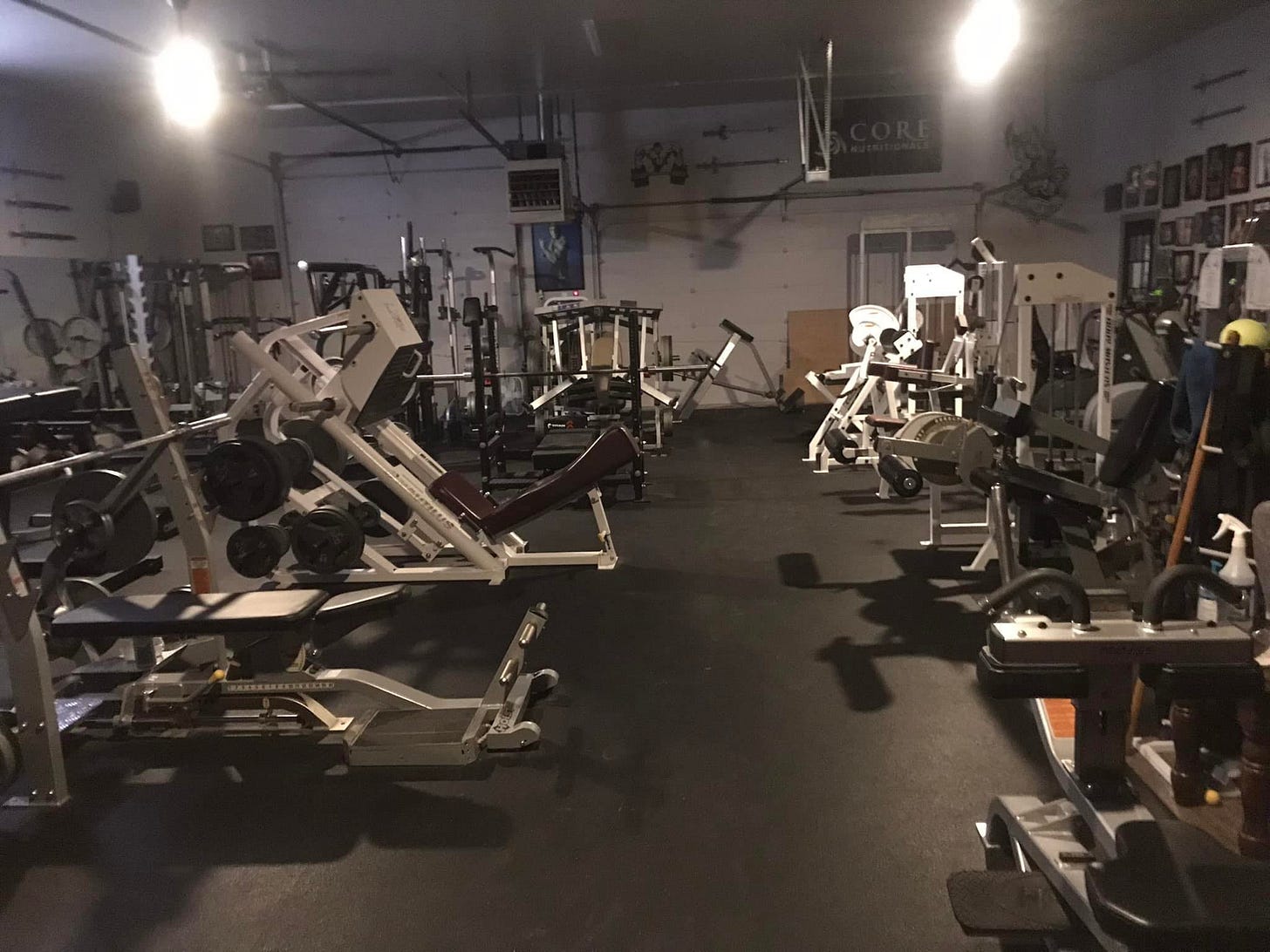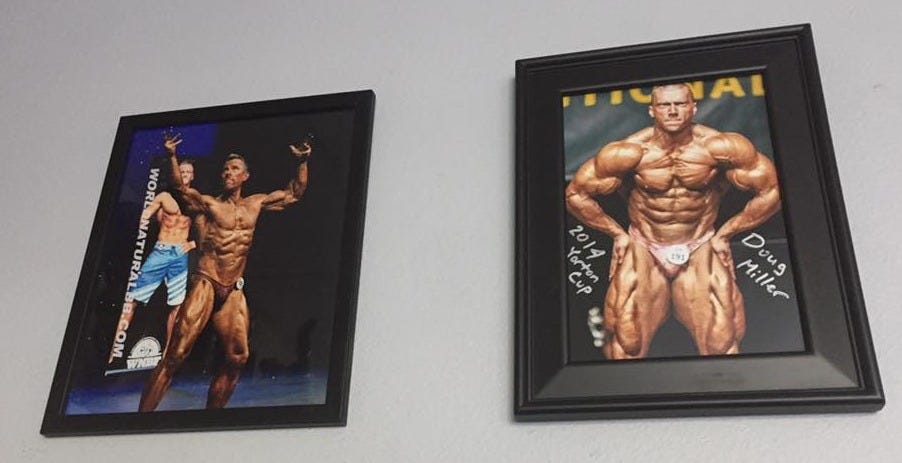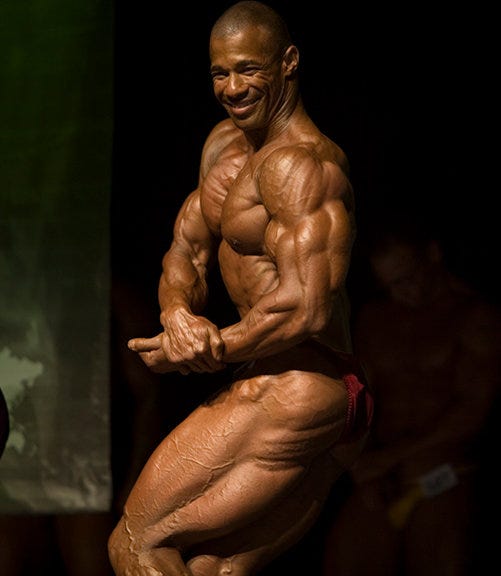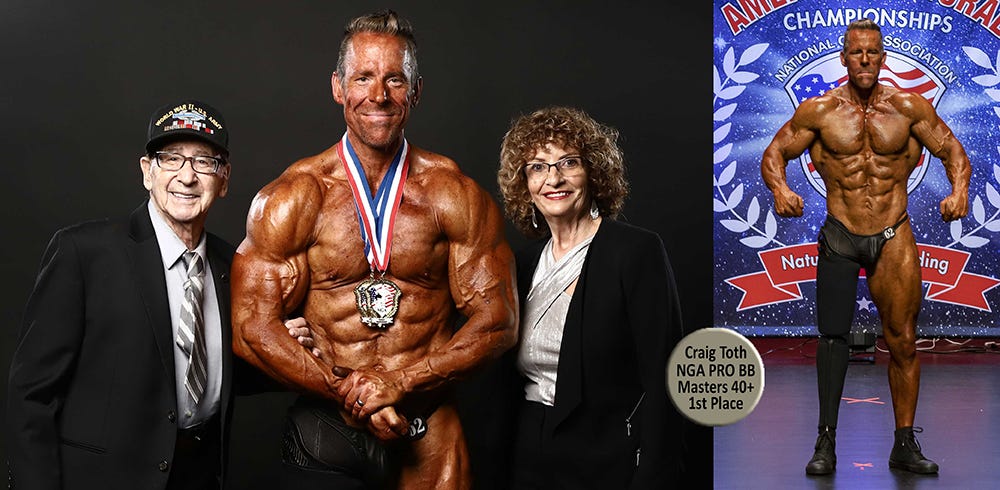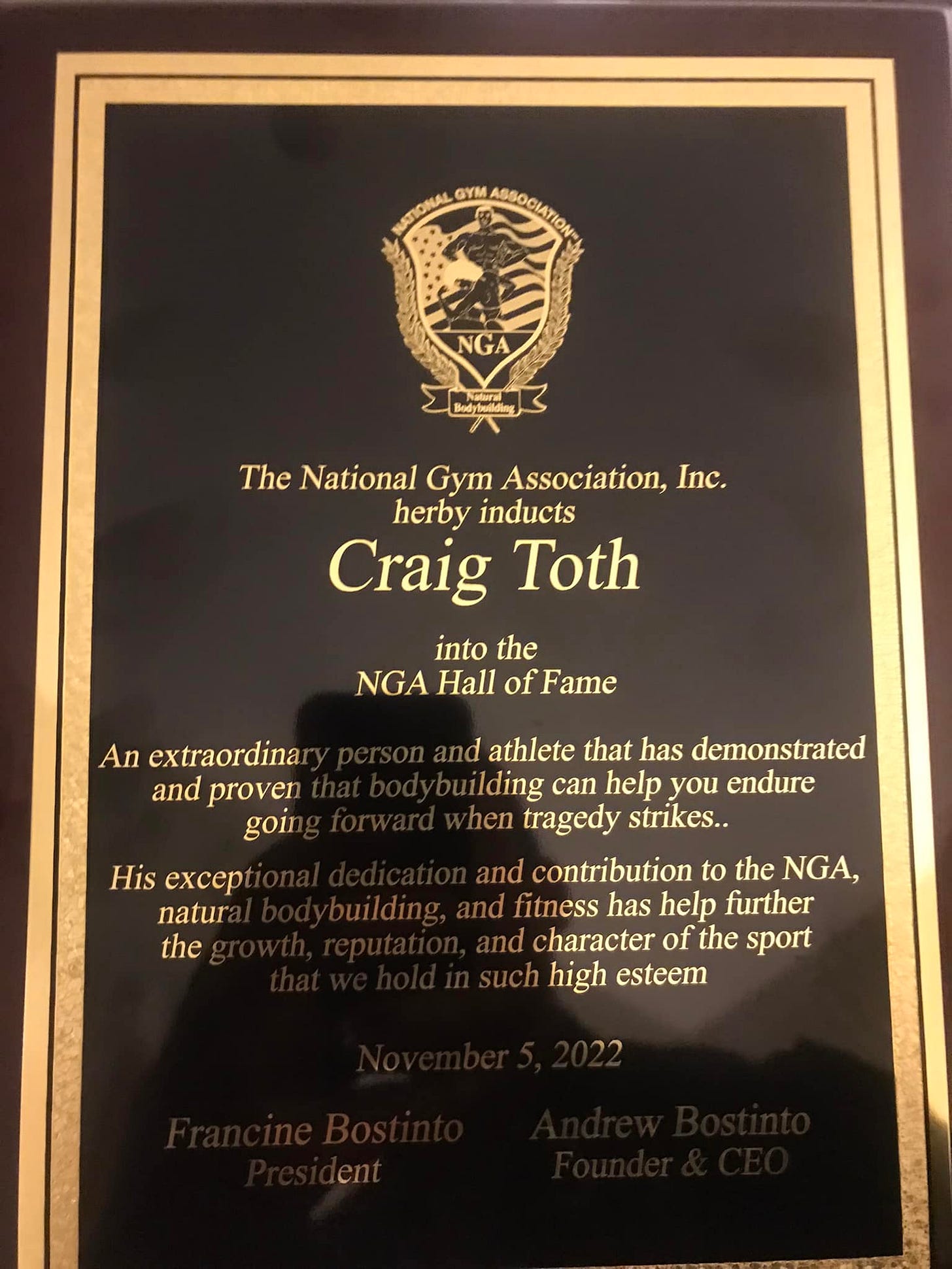The Tragic, Uplifting & Heartbreaking Story of Craig Toth
In Honour of 17x Natural Bodybuilding Champion Craig Toth
Chapters
The Tragedy
“Bodybuilding Saved My life… Literally”
How Life Changed For Craig Toth (“So You Think You Had a Bad Day?”)
“You’re Not Broken, You’re Human”
“Those Are All Just Excuses…”
The Love For The Process
“There Was Zero Enjoyment”
If Craig Can, You Can!
The Inspiring Longevity of Craig Toth (“It Boils Down To This…”)
Arm Day Reconsidered (Questioning Tradition)
UPPER LOWER SPLIT the Craig Toth Way
Craig Toth’s Home Gym Studio
“Life Can Go Two Ways…”
The Greatest Natural Bodybuilder That Craig Has EVER Witnessed On Stage
The Final Episode
The Tragedy
Kenny: You had quite the last few years and I don't want to say they we’re a challenge because that's under an understatement, but maybe you want to elaborate for those who may not know your story as of recent.
Craig: Essentially, it was February 2019 and I was about halfway into prep for a bunch of shows. I had seven shows planned for 2019. My goal was to do classic physique in the NPC and see how well I could do. I felt like I had pretty good chances in the over 45 at the national level, so I wanted to give it a shot. Obviously until classic came around it wasn’t really realistic for a natural - especially a heavyweight natural - to be able to compete at a national level and do anything in open bodybuilding. So, I wanted to do that, but then also do some IPE (International Pro Elite) shows, maybe WNBF (World Natural Bodybuilding Federation) I had seven or eight shows lined up. It was early in the year, so it wasn't really concrete, but I started developing flu like symptoms, essentially I thought I had a nasty flu and I thought that's really all it was, but first time around I had flu like symptoms and I had this weird swelling on my left arm. I thought it was actually a bug bite - like a spider bite - because there was a sore that I thought was a bug bite and my arm was red, but that actually wasn't what I was worried about, it was this horrendous fever. So I went to a primary health doctor and I thought they would just put me on antibiotics for the flu complications. I thought maybe I had bronchitis, but she had basically immediately sent me to the ER because she pointed out that my arm looked like it was infected and if there was red streaks going towards my heart, which indicates possibility of blood infection sepsis and I really didn't think that much of it, so I drove myself about 20 miles to St Lukes and by the time I got there I barely could stay conscious, honestly it got way worse than that, 20-30 minutes later and they admitted me and they thought at first it was just that, flu stuff, but my white blood cells were almost zero, lower than cancer patients that are on chemo, like my white blood cell count was virtually non-existent. I think it was like a 70 and normal it’s above 1500, like you're probably sitting here with a 6000 white blood cell count. My neutrophils were under 100. They admitted me to the cancer ward because it's the only one where they have certain policies to protect from infection because any infection could have basically killed me at that point, so they didn't know what the hell was going on and I went home and they said in two to three weeks maybe find a specialist, which again I kind of figured it was a bite and I had a reaction. Well two weeks passed and I had flu-like symptoms again, but they came out super fast. I remember I had literally lifted, I did an upper body lift and I literally drove myself home and suddenly I remember telling my wife I feel like i'm getting a fever again and literally overnight it got horrendous, my wife came home from work - she's a teacher - and basically saw me and said we're going right to the ER, so we went to the ER and my memory fades from that point. I vaguely remember my son who's 19 now, helping me in the car and I don't remember much after getting there, but essentially everything got worse and fast. They initially just thought I was sick. They did a bunch of blood work and in the interim of a few hours I just started swelling in places, my legs started just swelling and I don't remember this, I don't have any recollection. I was probably in and out of consciousness, but I don't remember anything - well I remember a few little things - but not much, but my legs started swelling and over the next day they started removing chunks of my leg. It was infected. It was infected from the inside, not externally and they removed chunks of my right leg. They removed a little piece of my left Soleus, a little segment of my upper clavicular fibers, so when I do progress pictures now, it probably looks like a cut but there's a little divot in my upper pec that was the size of a sausage, so my whole body was disinfected from the inside.
I went septic on Saturday night, so literally a day and a half, I went septic and flatlined for over six minutes. Normally at four and a half they call it, it's over and done and one of the doctors came in and I had all the young residents, they were all second and third year residents and I got to know them all really well afterwards, but they came in and they said “should we call it?” and she was like, let's give it another shot, they went another two minutes and resuscitated me and they got me up, they got me a heart rate again and I stayed unconscious for five days. About eight hours later they removed my leg because they knew that that was killing me. The infection everywhere in my body was killing me because your organs have to move all that dead tissue. I had 20 some thousand lactate level on that initial blood test, which means you should be dead because normal is like 3000. Your body is removing dead tissue, so your body only has limited capability to do that, so they removed my leg. I don't know if that's when they removed the chunk from my chest or if that was earlier, I really don't know because I have over a week of no memory, so at that point, that was a Sunday morning and I didn't wake up until Thursday. I believe I was supposed to wake up Monday, so at that point they figured I very well could have brain damage or no brain activity at all. My kidneys were stopped, I was on dialysis, they had completely shut down and my heart was flatlined for six minutes. They were concerned of possibly congestive heart failure, or a damaged heart in general. All my organs had stopped. I was incubated when I woke up, I couldn't breathe on my own, I thought when I woke up that I was going to be dead very soon. I don't know how you can know that, or think that, because I had no knowledge of any of this happening, the last thing I remember is having a fever, to be having a fever and then you wake up a week later, I didn't know it was a week later, to me it could have been five minutes, or could have been ten years, I had no knowledge of that, but I woke up pretty frantic because I don't know that I knew that my leg was gone, or if I knew much of anything, but I had wires everywhere. Anyways I was in there for 80 days, in and out of the icu for 80 days, I had 25 surgeries roughly, my leg required surgery about every three days to wash out the dead tissue and to try to get it to heal because it wasn't just an amputation like if somebody got in a car wreck, it was from a Clostridium difficile which is a bacteria that isn't just flushing, it's muscle eating, so they had no known survivors in the national database, which means they didn't know how to treat it because nobody made it to the hospital, because usually it kills you within eight hours and people never even make it. They get flu-like symptoms and they're dead. They believed I probably survived because I had enough muscle for it to eat, normally you don't have much muscle or enough muscle it eats, it would have been game over and they believe I just simply had enough muscle to feed it.
Kenny: So bodybuilding almost saved you at that point. The fact that you were so muscular, it saved you in that moment?
Craig: My doctors unequivocally said that's exactly what saved me.
Kenny: Holy smokes.
Craig: There's no doubt in their mind, but it was almost an impossible situation because they had no idea how to treat it.
“Bodybuilding Saved My Life… Literally!”
I was listed as terminal for over a month. I would hear nurses outside my room saying that he'll be dead soon, essentially you hear that because they think you're passed out, they don't think you're conscious and you're coming in and out of consciousness and with all the drugs and all that it started to get better, then it got worse at about 40 days in because I was bleeding out internally, things just didn't get better and it sounds a little more obvious now but they really didn't know why I wasn't getting better. At first - when I was first in there - they were like “oh what supplements does he take? and “he may be injecting” yeah because steroid users inject into their upper pec and into their Soleus, I mean that doesn't make any sense! They just had no idea, so they were jumping on everything. They wanted my wife to bring in all the supplements I take, which was creatine and citrulline and multivitamins and omegas, you know what I mean, they're not super fancy or crazy, which obviously annoyed me because the whole time I'm like “that's not it guys, move on” you know, just move on, that's not it, let's try to find a reasonable answer and not like whatever this is. I weighed under 130 pounds at the end of this.
Kenny: and you compete as a heavyweight right? So if you were weighing 130 pounds…
Craig: Yeah so on stage I’m around to 212-ish, which is about what I was when I got to IPE Worlds. The lowest my weight ever got was about 200 pounds, but not stage weight, like low weights deep into prep with really low carbs. I was about 215 pounds when this happened, probably 10 to 12 pounds away from contest weight
Kenny: What’s your off-season weight?
Craig: I tried to stay reasonably lean, around 230 pounds morning weight. Earlier in my career I competed at a heavier weight, or I go heavier in my off season, but in that range. So I had lost 150 pounds. They know what causes that, so Clostridium Septicum - everybody has those bacterias - but they're not allowed in the bloodstream, so that seepage through is what caused it to enter out of that contained area, your bowels have all that nasty bacteria, but they're contained that's why there's a lot of times I think people will hear about somebody just dying in their sleep, you know it's this kind of stuff that people just die and they don't really know why, because what are they going to do, cut the person apart trying to discover what happened? It's just one of those things, it's like a heart virus type of death. There's a lot of people that die with this kind of stuff, you just don't know because they're dead and what's the point, you know what I mean? And nobody really knows and you're not going to devote that much medical attention to try to figure out the mechanism. I know there's people on my facebook - there's a little girl that is on my facebook - and something similar happened with her appendix and she's had tons of surgeries, luckily she didn't have sepsis, because sepsis alone kills, half the people that have it that die by itself, but over time luckily my kidneys recovered so the dialysis thing faded away I think, so my kidneys recovered, my heart seems to have no issues really, I'm the person I was before, except missing a leg.
How Life Changed For Craig Toth
Kenny: How has this experience your sharing now influenced your life? Forget bodybuilding for a second, but what your outlook on life is now? Has it changed from before to now?
Craig: It's pretty hard to really express that because it changes everything. The prosthetic stuff is extraordinarily difficult. I’ve been battling that. I have a prosthetic I wear in my upper body lifts even that part of it is very difficult to deal with. Hopefully I can compete again, but there's a million things I can't do that everybody else does. I mean it sounds like you're a big complainer because you know everybody has certain things they can't do, but I have two grown kids, but I also have a six-year-old and I can't do a million things that I could with my older kids, you know what I mean? you're suddenly reserved to a life that's extraordinarily limited, things most people can't comprehend, for example I was a big movie goer before, it's a pain in my butt now, I really don't want to go to a movie and hobble around and go through all that to go to a movie and there's certain things - yes you could do them - you could, but the amount of discomfort you have to go through to do them makes it not worth it, people complain about the pandemic, that's just my life all the time, I can tell you right now, I leave the house so often that when I do I feel like the world has changed. When I do like there's a bunch of new buildings. Unless it's for a kids event or something there's really no point for me to do it. The way you perceive other people's complaints can be very cynical, which I try not to be but when people complain about their boo boos you know when they say “oh I strained my hamstring” or “oh my knee hurts a little bit” be glad you got a knee you know? and you're human, you're going to have boo boos, you know you're human you're gonna have issues, just be glad that you're still able to do mostly everything you wanted to within a reasonable framework, you know I have a ton of clients and a lot of people I coach and I have to check that because I can't be that cynical about everybody's concerns because I mean that's just their perception now and I have to be open to that and can't be that critical, but it makes it hard to understand how a lot of people think honestly, what the things a lot of people complain about and the first year probably I had pretty much non-stop nightmares. When you're in an ICU that long you get all kinds of weird symptoms and and weird paranoia. They have a name for it, but when you're in an ICU that long you become like a paranoid delusion you don't ever sleep, it's like being in a torture camp for 80 days, every single day and it’s is honestly pure torture. I mean, I got to the point where I was was going to surgery every other day, it was just normal like oh surgery, okay, oh I'm bleeding out, I flatlined three different times...
My perception of death is way different than other people’s. There were a lot of times where I was like “well if I die, that might be better, it might be a lot easier - a hell of a lot easier - and a lot less pain. So yeah, it changes your whole perception of absolutely everything.
“So You Think You Had A Bad Day?” By Craig Toth
“So you think you had a bad day?
I found this under my old texts. My nurse took this picture after about a month into my fun journey 2 years ago. It got worse after this, 2 more months and countless more surgeries awaited me. I remember this day. When I sat up in the hospital bed I vomited. The room was swirling. I wasn’t sure if I could get into the chair at all. Looking at this picture makes me wanna vomit still. If I could make people understand better what a bad day is maybe they could know how spilling their coffee, getting in an argument with their spouse or just waking up grumpy isn’t that bad.
I’m betting I was 125lbs here...
And you know what? All I could think about was lifting in the hospital rehab gym. So I could get onstage again.”
“You’re Not Broken, You’re Human”
I think also what my experience has done in terms of my training is that I was in that same boat with people where - you know - you get a little bit of tennis elbow, or some golfers elbow, your knee is irritated a little bit and you feel like “oh I can't compete or, I can't make good gains” and people go “oh, maybe I should just go and do some other sport” you know, that's a funny thing anyway, people say “oh I can't do bodybuilding because it injures me” well I hate to tell you any sport you're going to do is going to probably cause more injury than that, not less. Go play some basketball and see how that knee feels, you know what I mean? Like literally it's called golfers elbow because it's comes from… golf. You know, your tennis elbow? I hate tell you it wasn't just from doing your rows, that comes from… tennis, yeah, I see all the time people are like “I'm not going to do bodybuilding because it's so hard on your body” well that's kind of a bunch of crap, number one as far as all these things go because there's so many ways you can get results, there's so many mechanisms and movements you can do to work around that, so for me my big question coming back is that you know I can't do classic deadlifts, I do one legged RDL's, squats are out, I live on a leg press.

The questions is, can I make gains that will even put me close to where I was at before, let alone beyond that and nobody just wants to train to get back to where they were before, even that's depressing, and even the things I can do when you bench press one legged, I mean I do use the prosthetic but you don't have the same leg drive, when I do row motions it changes when you're on one leg and lot of machines you can't even get on with the prosthetic, they need to be one legged so even your upper body training is completely different, I think “am I going to be able to have productive training?” and even with what I've had, I mean I have no doubt that this is by far the biggest I've ever been. I've never been not even close!
“To me it's about passion, you'll find the answer to your problem if you have passion! You won't ever find the answer if you have a place of vacancy in your heart with it.”
Taken midway through October of 2022, prior to stepping on stage for what would be Craig Toth’s very last contest season. Unbelievable!!!!
so you know I look at that, it makes me kind of giggle, more about everybody throwing everything away because of these minor little ailments that are perfectly normal. I tell you what, you lift hard you're going to have an achy shoulder at times, you're going to have jacked up trap sometimes, you're going to need those massages at some point, you're probably going to have an achy knee, you're going to have about everything at some point and you just got to learn to either lighten the loads a bit, change your movement patterns, take a week off, whatever! There's a million ways, it doesn't mean you're broken, it just means you're human. That's just something that I already knew, but it just changes the perception, because you know the bottom line is stimulus is stimulus and there's a lot of ways to for almost every body part to get stimulus without staying with that exact pattern of movement that got you in trouble in the first place, or just isn't possible because of whatever issue you have.
“Those Are All Just Excuses…”
You just got to be creative and you can't be so emotional that you throw everything away because it didn't go perfectly for you, really? That's like what a toddler does, right that's what a little kid does, you know what I mean? Our ego tends to pop out and tends to act like little kids and at some point you've got to ditch that stuff and/or you can just quit all together, you can just do that you can quit quit because you wanted to not because you had to and just say that, “hey it wasn't worth it to me anymore, I'd rather not do it, I want to go do something else” that's fine, but don't quit because you say it's not possible, or that there aren't ways to get to that same result, that's just not factual, that's just simply not true. You want to find a way to quit, the same way everybody does for some reason when they don't even have injuries right like “oh it's not good because I'm getting married and I can't compete because I'm married” or “I can't compete because I have children” or “I can't compete because my job's too hard” or whatever those are all just excuses too. So the one leg is an excuse too if I say I can't do it because I have one leg, that's no different, it really isn't. In the end I got all the other body parts why not build those? I'm missing 16%, well I got 84%, so in the end - you know I know you're podcast is about longevity and there's a million things you can go into talking about that, but in the end being able to to improve with longevity is the only way I can put it, it's giving a $hit like you did when you started!
When you're 30 years into it, that's what it is, that way you cared when you started at 19 or whatever age, for me it was like 12, but whatever age that is. Even if you started at 28 you had all that passion, you had all that drive, you were all into it. It's about having that however many years later, that is what we're talking about and most people don't and that's really what it is, if you could become that cynical old man and you're 56 years old and you're sitting around talking about yesterday then you're not going to be able to improve today, that's really what it boils down to. To me it's about passion, you'll find the answer to your problem if you have passion, you won't ever find the answer if you have a place of vacancy in your heart with it. That's really what it comes down to, the love for the process.
The Love For The Process
Kenny: How important is that because you in literally the blink of an eye, all that hard work gone and I saw that picture, I think you were in a wheelchair and you were doing the lat pull downs and you were probably - if I had to guess - in the 135lb range, like that's what it look like and it's like, how in your right mind from that point do you go from there to where you are now if you don't love the process, it's like all that hard work was just vanished if you want to elaborate on that…
Craig: It's a complicated question and I established a level of respect with everybody that they just let me do whatever I wanted to at that point. I think because they expected me to be dead so far before that, so many times, at some point I think they said this guy's terminal we're going to let him do whatever the hell he wants, that was earlier on, not at the point of that picture, but probably just three weeks after it and at that point I think they were just like “if this guy can endure what he's done, then I don't have the guts to tell him no”, so yeah I went down and worked out almost every day. I basically said “wheel me down to the gym” and I had 10 exercises on this old circuit thing and I would have them put a strap on my ankle that was sitting in a corner, it was like those little ankle strap sitting dusty. I had to put it on my ankle and explain to them how to wheel the wheelchair around so I could do leg extensions and leg curls off the pulley system. There was a chest press and a dip machine and a few other things for triceps and biceps. I spent like an hour in there pretty much every day, even with no food at that point because I couldn't eat because it was after the stomach surgery and I could hardly eat anything at that point. I was eating probably 800 calories a day. They still had me in an IV giving me mostly what I needed, but I guess because for me lifting in general whether you call it bodybuilding or not, for me it's always been about a place that I can go to that I can block out the rest of the world, It just goes back to my childhood and it was my place to kind of hide in a way and in sports it was my magic ticket to a lot of success because I was one of the few kids that lifted and it was always this thing that I could do sort of better than everybody else, so when I was down and out it was always a place for me to go and there was never a time when I was more down and out than that, so it was just my place of like “hey when I can't control the world, this is something I can always run to” I didn't know what I could gain back, I really didn't, but it didn't matter at that point, the gain was to be able to do the one thing I could really do well and to be able to do something with it again, to feel like I didn't lose, you know? I lost a leg and I lost 100lbs of muscle and I lost my health, because at that point they actually thought because of my blood results I very well might have bone marrow cancer and I had to do bone biopsies after that, they really didn't know. There was no doubt even when I left the hospital that I very well could be dead soon, that I very well could have something that caused my neutrophil levels to go that low because they were not buying that it was just that one little carcinoid, so there was a fear that I was terminal effect, so to me it was like - I told my wife all the time if i’m not be alive in a year - I very well could be gone in a year, so I'm just going to burn this candle out as much as I can. That's really what I would tell people all the time. I'm gonna do absolutely everything I can, living the way I did before if not better than the way I did it before and there's no guarantee of muscle gain, there's no guarantee that I'm going to be out of the hospital consistently and there's no guarantee I'm even going to be alive, so I'm just going to burn the candle as hard as I can.
“There Was Zero Enjoyment”
Kenny: Did a part of you take it like a challenge to see “okay I'm at the lowest of the lowest, relatively speaking, did you almost find enjoyment in that or was it not even about that it was just because you love it and you just wanted to do the thing that you loved again.
Craig: There was zero enjoyment for a long time because I was sleeping 16 hours a day. I would literally go to sleep at 8:30pm, get up at 11:00am the next day and my wife worked at the middle school a mile away, so there’s no way I was going to go to a commercial gym. My gym had to be shut down. I had a studio I had to shut down because I was in the hospital for four or five months. I lost my gym, all my stuff was in storage, I put an office in my guest room where I would meet with some of my clients and consult, but not a lot because I couldn't handle it, so she would come back right when school got out pick me up, take me back and I'd work out at the junior high for about a year and then the pandemic hit so I had to work out at a buddy's gym because they wouldn't even let me do it at school, but for the first year I worked out with free weights and cable equipment in this little Junior High and it was incredibly hard just to get there and have the energy to do anything. I would sit in a chair at this little table and I would just shake my head and be like “I don't know how the hell I'm going to get through this” and I would literally be so weak that I would have the lightest weight on every machine, literally no weight. I benched the bar and that wasn't easy when I first went back, so there's no enjoyment of that, there's no enjoyment when you're like “yeah I could deadlift 700 before” I went in now, I can't even been over to grab a bar, I couldn't do a pull-up, I couldn't raise my arm up, I literally could not physically raise my arm. I couldn't wash my hair. My shoulders were so messed up, I couldn't even raise them. When you're in a hospital bed for 70 days it destroys your body, absolutely destroys your body! So it was absolute hell for a long time, a long time.
If Craig Can, You Can!
Kenny: It's remarkable to see just the photos that you've been putting up when you hear about - and obviously this is a different category of bodybuilding - but Ronnie Coleman. His story with everything that he had gone through with his surgeries and yet he’s still doing his thing, but it seems like for you - because it's natural bodybuilding - you'd love to compete again? Is that something that you're preparing for currently?
Craig: It really depends on if this works out with this other prosthetic company. I hope that it happens in July where I can get into a different socket fit, that's a really complicated thing, but if I can get where I can move around adequately then I'll do it. My goal is really that I want to do NPC and the NGA and really the NGA because that's where it started for me. When I started there wasn't much else than the NGA Universe. It's not like it was 20 years ago where a lot of people started in the WNBF and maybe the WNBF is bigger, but my perception is different with that stuff, I don't really care about if people view me as the greatest nor do I need to go to the biggest shows to be seen as the best natural guy around, I don't care about any of that anymore. There was a point where I did, you know you want to build some kind of Legacy in a name and that stuff doesn't matter to me at all, it means nothing to me. The NGA universe is where it started for me, it was my second Pro Show and the Winner was Philip Philip Ricardo Jr. Cleveland Thomas was number two, number three was Earl Schneider, number four was David Lovelace and I think I was six. I can’t remember who was five, but that was my second show and it’s just has a special show for me.
The Inspiring Longevity of Craig Toth
Craig Toth At The 1994 NGA Northwest Natural
“My 3rd bodybuilding contest and the first one that I actually put an effort in was the 1994 NGA Northwest Natural. I had success before that but I was eating mac and cheese and pizza. My routine was to the theme song on T2. If I ever compete again that’s what it will be. If they even do routines by then. Who knows… my cat broke my 3’ trophy so this was the replacement. Still a show that I remember more than any. I was about 221 pounds and 22 here ... dieted for 8 weeks and skated in. Didn’t know what I was doing, but I worked hard doing it.”
“These two 25 year old trophies are the first 2 I ever received. They are trashed and beat up and worthless In any real value, but they are my first ones and have been thru 8 or so moves across the country and remind me every time before my lifts as I’m preparing lunch how long I’ve been at this sport. After 100 shows the first 2 stick in my head more than the last 98. The one thing that stays constant is I wanted to just get better then and I still do now. Winning and placement has less relevance as the years pass. These ones aren’t displayed in my studio - just sit in the back to remind me I’m no different than I was at 20 years old. No better or worse. Just trying to improve ...”
I want to do that that show and I want to do the NPC and qualify for the over 50 at a national level, over 50 in classic and probably bodybuilding too and see how I do against the over 50 juicers and I think honestly if I'm being unbiased really, I don't think in the over 50 class I'm going to give up size to anybody quite frankly, they might dock me down with the one leg, it is what it is you know, I would do the same if I was a judge, I don't know, hopefully though if I can get where I want to - conditioning wise - I think a lot of control is still in my own hands really, I think I have a capability to do very well at that level actually, but we'll see. I have to be able to move around and pose and do the things I feel like I need to do to be competent, so we'll see. If it doesn't happen this year then it's next year, but you know I'm about 20 weeks into a diet. I'm getting just to the point where I need to start grinding, where it actually starts to get hard, basically it's been pretty easy at this point but we'll see. It's a carrot that I dangle and the thing is in the end I'm a bodybuilder regardless, I'm a bodybuilder regardless. I mean I've done over 100 shows pretty much every federation, I think.
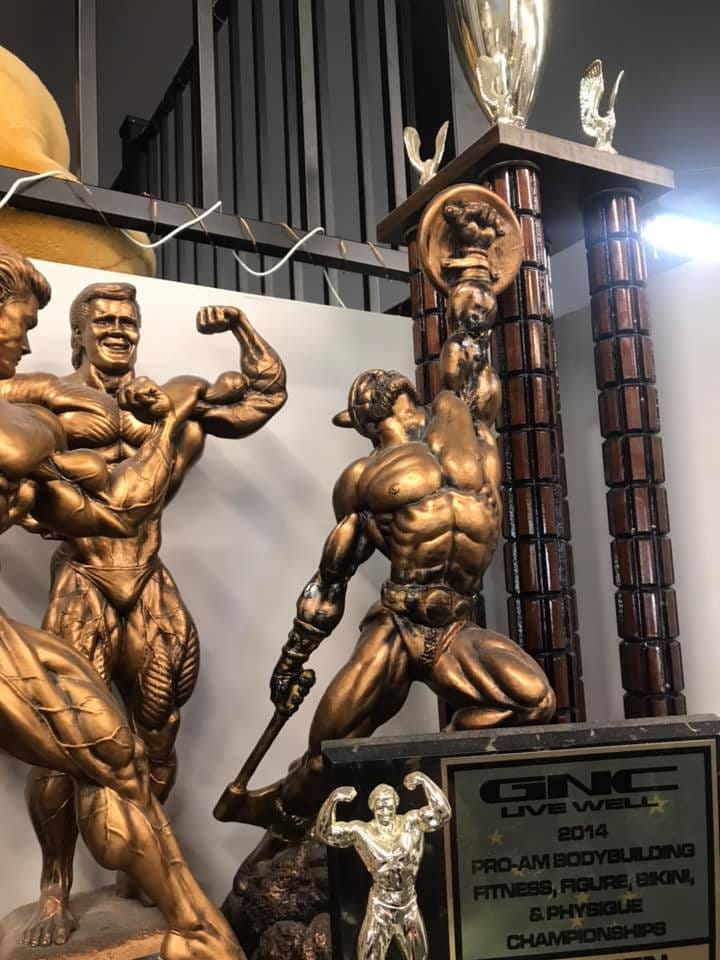
I guess not the DFAC, I guess that's one of the few I haven't done. Pretty much everything else I think I've done and like I said I’m a bodybuilder regardless because I just love this stuff and I will only compete if I feel like I can elevate where I was before and of course I won't have a leg. Outside of that though if I can be better than I was before then I'll do it. If I don't feel like the rest of me can be quite a bit better than before then I won't. I think that in certain areas I'm just way beyond where I was. Legs always was something that would lean out late in a prep for me, but in the context of where that's even right now, I know that my quads and hams are noticeably bigger than they were then and much stronger too, but that's something that I'll really know when I get that last - you know - 10-12 pounds off because like I said that's an area that just leans out for most people later on really, you know will that just be overshadowed by the leg… that's for other people to decide really, you know what I mean? There's, like I said…
there's things under your control and there's things that aren't and I think for what I can control I can literally say I have not only done my best, I've emptied the tank constantly on a daily basis, more than I ever did before. That's what I think people need to ask themselves if they want to have longevity,
being 50 is not a big deal, being 50 is just not a big deal. Losing limbs, I will say that can feel like a pretty big deal, but I don't understand the whole mourning over being 50 now. I really don't understand it honestly.

Another set of photos that were published in October of 2022 by Craig Toth, approximately 4 months post recorded interview with Longevity Muscle!
Kenny: I mean you got Jeff Alberts, Philip Ricardo Jr. Kiyoshi Moody's coming back after his you challenges that he went through, you have Marshall Johnson who competed almost up until 60. Actually he competed last week, 62 years old.
Craig: Get out, I never saw that!
Kenny: Yeah, a week or two ago, yeah Alberto popped up on my feed because somebody had tagged him. I thought it was old at first, but it's not it's like two weeks ago and then Alberto posted something on Instagram too. 62 years old he came out of the shadows,
Craig: Wow.
Kenny: When I was talking to Philip he had said that Marshall's not in bodybuilding anymore and I guess he kind of just surprised everyone.
Craig: I guess, so you know in 2012 at the Universe he was right at the beginning of that comeback. I competed against him right at the very beginning of that. I think he was like 51 or 52. I've been in a lot of shows with Marshall, but the list is pretty short, but I think the list is short because of choice not because of anything else and then that's fine people get other interests, they get bored of it, they don't like it, whatever that's fine, but the chronology of life thinking that you're just going to degrade that much is kind of silly.
I think that's people's lack of intellectual flexing. If you're going to be lazy mentally where you're not willing to learn and change, it's not 1985 anymore bro, if you're not willing to change and adapt and evolve then you are going to get worse because those little things are gonna happen - like I said before - the tweaked knee, those things are going to happen. If you still think “oh I just got a squat or I can't make gains” and you push through that you're gonna end yourself. You're going to blow that knee out, you're going to have an injury that's way beyond doing anything you can't do on a leg press. Now you can't do whatever opposed to the little tweaks you had when you were a meathead and I think the biggest thing is people need to make sure their wisdom grows directly with age. It usually doesn't. It usually just doesn't. People just almost get dumber, I mean really they do. It's like they're 45, they're talking about the training practices from 1992. Fitness is so new, it's so new really, if you think of it, it’s as new as computers and I don't mean Fitness, like I'm not talking like the Greeks, I'm talking like bodybuilding and lifting with this artificial modality, the weights in this sense. If you look at computers really evolving from the mid 70s, well you think back to the bodybuilding, I mean it was pretty infantile in 1975, like look at the gyms Arnold lifted in and you're like “oh my gosh” that looks like a museum.
and of course we had bodybuilding somewhat before that, right we had John Grimek and Steve Reeves, Reg Park, but then you're talking about really archaic stuff. John Grimek trained in his basement, attaching an apparatus to a beam that he snaps and about collapses his whole house onto.
Kenny: It's funny you bring that up because you have to wonder about the longevity of these guys. I don't know where it goes because with those practices, could that really take you that far? The way they were doing things you got to wonder, some of these guys quit at an early age, you want to talk about these practices from the 70s, it's like where's the longevity in that?
Craig: right there isn't because the equipment sucked. Most cases if you didn't squat, what were you going to do? I mean I'd be screwed beyond belief, there wouldn't be equipment that would accommodate me. I would be absolutely done in every way shape and form. I mean I can't go do dumbbell bench, I lay back and fall off, you know what I mean? I have some garbage bench that I probably couldn't even get stability on. I mean it'd just be ridiculous. It would really be absurd, no matter what I may desire. I'd be massively backtracking, there'd be no way around it and that's what happens in the normal stage for most people, even if they did mature and get more wise they really don't have a way to apply that unless they go and make their own equipment, which I'm sure some of them did, they just created some equipment to make things better right, but there's limitations to the ability of people to do that, so I think that we're in a place where there's a lot of exponential growth right now, you have all these companies on the internet, you have Rogue, but now you have like a million of them like there's just so many different companies and equipment that you can get about anything you want, you can get all these versions that can help your longevity, but you got to try to make an effort, most people don't. First time a challenge comes up they are out, they are out. period. That's a passion problem when usually a passion problem comes from a goal problem, so in other words their goal, let's say even in bodybuilding, their goal is “I want to be a world champion” man I want to be the best, let's say their is a smaller guy, “I want to be a lightweight world champion” that's it, it's the end goal. period. The moment where they think that maybe they don't have the genetics for that, most people don't right? I mean world champions or even somebody that can win a pro show is a tiny percent, the amount of people that can even go pro in any legitimate pro organization, that's even a tiny percent, but to actually be a good pro, an elite pro, you're talking about tiny minuscule numbers. A world champion in a legit federation, well okay most people are just out, all right, so the moment that happens they're like “okay, well I'm out. I can't be a world champion, I'm done.” It's passion problem. You wanted to impress people that's all it was. You didn't have any real passion passion and that's really what longevity is.
What I think it boils down to, I think it boils down to wisdom and passion
I think that's it. That's all you need to have longevity.
Kenny: That's an extremely important thing you had mentioned with people who say “oh I'm not built for this” when little things kind of start to creeping up on them and they just kind of back off right away, it's like wait a second, that's not how any athlete of any level would approach this, never mind a world champion.
Craig: Right and I would just argue that those goals, again are most likely about the wrong thing, any good competitor wants to win, they want to dominate. Anybody who does is wired that way, but it just has to go deeper than that. I watched the video with Philip where he mentioned that - he literally he said, I think his words were - that he's not the bodybuilder he used to be and that if he wanted to be better he knew he was going to have to up his game. My point is that he still does it because he's passionate about it, there's a certain level of courage I think that comes with saying if I backslide and people see me differently then so be it, that's them, they can see me however they want, you know what I mean? I have a certain level of respect for that. I would hope that people have enough passion too though to say I can improve at 51 or 52 also, which I think he does. I mean I'm not putting words into his mouth.
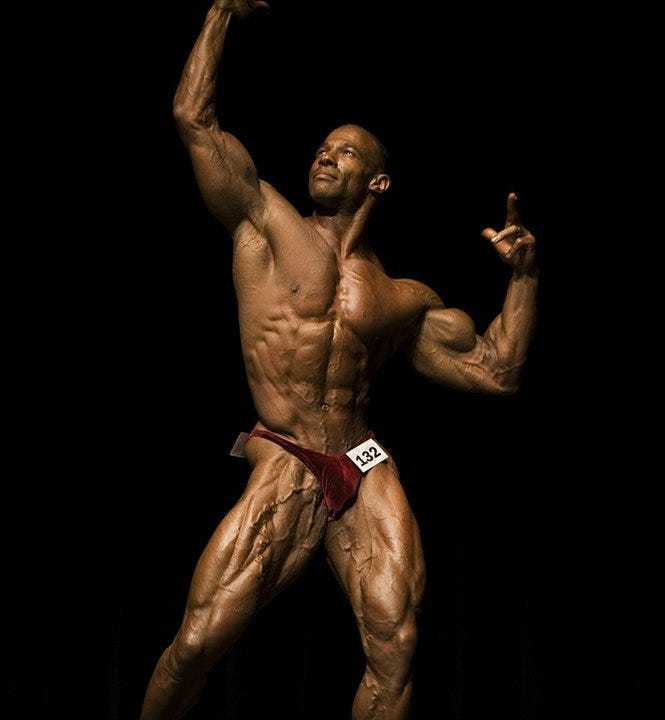
Kenny: I'm going to bring this up because it's important, he mentioned that there were some things that he wasn't doing that he knows he could have done, which is why his physique wasn't the way it once was and why he felt that way. For example, he wasn't doing certain things training wise with certain levels of intent. He was kind of just going through the motions and just more focusing on the euphoria of what a workout would give you. Almost like general health, as opposed to “I want to go do this at an elite level again.”
Craig: So you might see a very different Philip a couple years from now. What does that come down to though? Passion. There's enjoyment, that's not the same thing. Going to the gym and enjoying it is not the same as saying “I'm going on to go in and I'm going to endure some wicked hard stuff” but with wisdom, then it gets really murky, then it gets really complicated because then you're enduring very calculated training, it's intense and wise and calculated in a way that you can progress and not get hurt and that's a fine freaking line, that has to come with a lot of analyzing your training, a lot of being open and getting help from people and not living in the past.
Arm Day Reconsidered (Questioning Tradition)
It's interesting because you had posted a picture of your arms and you were saying how you don't dedicate a whole arm day and maybe that's a genetic strong part for you and the reason I bring this up is because you mentioned calculated intensity, calculated way of approaching this with a certain amount of wisdom so you don't get hurt. A young mind might go in and be like “no I have to be the best, 20 sets for everything” but maybe ask yourself why are you doing it like that? You are going to probably burn yourself out at some point if you continue down that road.
Craig Toth on “Arm Days”
“I see many doing “arm “ specific days. While I think that sounds fun I’m not a proponent of spending that amount of physical resource to such a small muscle group. They get hit in so many ways from compound movements. I personally do 3 sets a week of bicep / tricep work. That’s all.Right now they are 20”. I may go to a whopping 6-8 sets per in a few months if they don’t get to 21” by May . Sometimes less is more. Oh/ look at the sanitizer. Hate corona. That beer sucks.”
Craig: Yeah so in 2012-2013 I hired Alberto Nunez, because I was 40-41 years old and I kind of felt like I had done what I could I really. I felt like I had won a lot of pro shows, but they were what I would call medium level, like State Pro shows and they weren't the big daddies you know what I mean? I placed decent at some big shows and I kind of felt like I was stagnant and not because I was 41, but just because I had already been in it that many years at that point I had eight years as a pro and 15 as an amateur and I just kind of felt like I needed to have an outside look and I was also a little bit bored with my own decisions, give or take. I wanted to just let somebody else have the reigns and he definitely changed some of my views on things.
He certainly got me out of the old “bro mentality” you know, like he's not a “bro lift” guy, at least with me he's not, he's not a “we're going to do back and biceps day and chest and triceps day and shoulders and calf day and quads day - which one day is a quad day, but whatever you know I mean - the old school bro splits and I was okay with that. I was okay with trying something new, so it was nice. I was all right with that and I started to improve, imagine that and a lot of it is I over dieted, I way over dieted. I did eight or nine shows a year for eight consecutive years so 2006, 2007, 2008, 2009, 2010, 2011, 2012 and 2013, I did about 65 Pro shows and imagine that, it was debilitating on my body, so we brought things way up in 2014 but in 2017 I had my best year even after taking a year off - well not a year off - but after my wrist that took a year to heal, that happened in early 2015 and it wasn't really healed until early 2016 and even with that 2017 was by far my best year


so anyways once I came back from this, probably about a year ago maybe, I started back with Alberto and we would just do Skype sessions like every three or four months, not real frequent, if I compete probably that last two months of the grind I'll hand him the reins so I don't overdo myself, overcook myself, or whatever mistakes we can all make by looking at ourselves too much and not looking at it objectively, so I'm a big fan of that too. That's also what I mean by wisdom, be wise enough to know that you're not perfect, you know?
I have a Masters degree in exercise physiology, I have about as much education - I think - that you can have in this area, but it doesn't matter. You can't view yourself objectively, you just can't do it, so Alberto’s the one that really reduced my arm training a bunch because he's like “you got to reduce that and feed the areas that need more” so I was like “oh okay, fine with me because I don't even like training arms” I had some tennis elbow from probably doing too much of it and I was fine with that, so we put in much more back work, way more back work, which I love training back anyways, a lot of specific delt work, it just changed a lot of things and that's something that regardless if I'm working with him for that span or not, I still go under that ideology in general.
UPPER LOWER SPLIT the Craig Toth Way
For me it’s just two upper body lifts and two lower body lifts a week and that's what it is. After the hospital it was full body lifts and stuff like that, but I'm just saying that once I'm in a good spot that's generally speaking what I do, it's four times a week, two uppers two lowers, there's spans where we've done five days and I was trying to get to a 500 pound bench last fall and I was benching four days a week, so I was doing five lifts where I benched on four of them, once I was done with that little goal we pulled that back to two, but in general it's four days. Now they're long, they're not short sessions, but still I have three days off either way
Kenny: And before that you ran like a typical bro split? You know, one day chest, one day back, one day legs, one day shoulders…?
Craig: Yeah exactly and so like yesterday my workout was a bench, chest flies, T-bar row, a Hammer strength high row, a Titan mid row, so it's three back and a tricep extensions - seated tricep extension - and a long head bicep movement. There was occlusion I did occlusion on a few things, oh and lateral raises on a pulley, but there was occlusion on a few different movements, mainly some arm occlusion, a little bit of lateral raise occlusion, so rep ranges can get weird, but roughly 3 sets of 12ish. I actually recently changed it where - because I'm deeper into a diet - where I do some high rep stuff thrown in, so like on my back work I'll have a set of 25 and a set of 15 and a set of six.
Kenny: Okay, so like a reverse pyramid kind of thing?
Craig: Yeah, so on the high row for example it would be two and a half plates aside for 25, three and a half plates aside for 12 and four and a half plates aside for six, but those things always change. My rep ranges do change pretty frequently and movement patterns change to some degree, but I'm not a big fan of overdoing that, but sometimes Alberto will throw a curveball and be like “hey let's do front raises, let's be weird!” in fact he put front raises on my last lift and he was like “I did them on my blocks but I didn't post it because I know it's controversial”
Kenny: Yeah? Uh oh! Haha, oh man he's sneaky man! The announcement is out! He's doing front raises folks.
Craig: Yeah, so you know we'll occasionally do little things like that, that are maybe unorthodox or whatever, but that's the general gist of it though.
Kenny: How long have you been running that for?
Craig: Like the last few years for the most part, since 2013.
Kenny: Wow okay, it’s interesting because it’s no secret that there’s a lot of people out there always searching for “the next best thing” meanwhile you were running a specific thing for almost the majority of your career and then pretty much ran something else for the latter part of your career. It's like two things basically. Whereas people are jumping from full body, to upper lower, to bro splits, it's like a million things within the span of a year and wonder why they don't get anywhere
Craig: Yeah I have periods of different approaches, my amateur years from 1993 to 2006 was one thing and 2006 to 2013 was another thing and 2013 to my leg - so 2019 - was one thing and this is a whole other thing. I really got to be wise.
Craig Toth’s Home Gym Studio
Kenny: By the way, that's a pretty cool setup you got there. I see that's like an art piece of you holding up the sword?
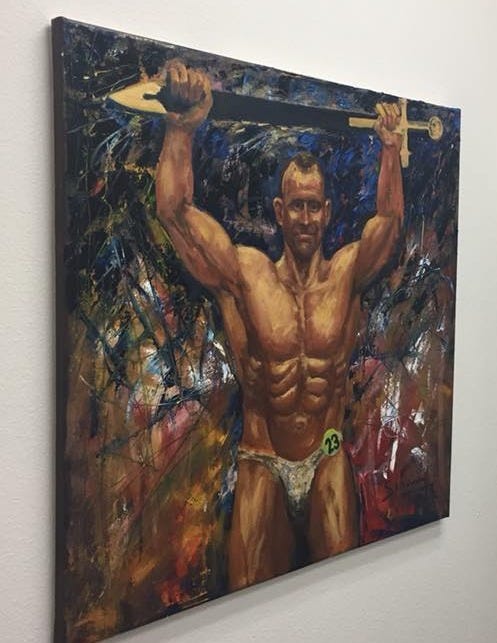
Craig: That was a client of mine who made that picture for me actually. My Gym's about 2500 square feet. I got like 40 pieces of equipment.
Kenny: Wow that's really cool, is that is that inside your house, or?
Craig: Let me show you…
It’s a 12 car garage next to our house. It was 2600 square feet, but we made a whole bathroom, shower, laundry room, it's got a kitchen in it, little living room and then most of it is the gym.
Kenny: Is it open to the public, or is that your own private spot?
Craig: It’s private but my clients can come in, so I have a handful of members and then my consults I can do over the phone, or I do here. A lot of them come here if they want to or with the pandemic of course we did a lot more remote, right now I have some out of town people, so it just depends, but they can come in if they want basically.
Kenny: That's a sweet setup!
Craig: Yeah it's a pretty nice, like I said my life would be perfect if I had two legs. My life would be somewhere on an acre of land, we have a beautiful lawn and big giant trees.
Kenny: Well, I tell you this much you're probably the most incredible natural bodybuilder that ever existed with one leg, like there's no one else, there's nobody else, you're number one.
“Life Can Go Two Ways…”
Craig: Haha, man! Hey man I do what it takes. If it takes removing a leg to be number one, I do it.
Kenny: You’re number one man, you got the gold and I know it's not about that for you, but it's inspiring man. It really is, like when I hear your story I'm fired up about life, just being grateful and reminding myself “dude you're not broken” Whenever you have some arm tightness and you're complaining and you think you're the only one because you're oblivious to what's going on in the world almost, because it's just you and yourself and you don't think…
Craig: And people have it way worse than me too, you know. I guess I'm saying I can feel like I'm on some kind of pity, which I get, I mean I'm not going to try to act like I don't, there's times that I put on my prosthetic and I'm putting it on three times in a lift because it's literally sliding off and my lift takes three and a half hours to get through and I'm like “this is just freaking ridiculous” nobody has to deal with this shit and you agree and you think “why should I work this hard if one day you can go to sleep and wake up and lose another leg” for all I know I can fall asleep tomorrow and wake up and I'm missing my arm, I mean for me that's all it was, it was literally I fell, had a flu, fell asleep and I woke up, bingo. There's no process, there was no process for me it was asleep, awake, gone. So if that is how your life can be, then why even do it?
There's times where that is very strong with me, that can go two ways on that lever…
the one way it goes is, you just say forget it and you sit around and watch Netflix and you sit around and marinade in your crap! which tell you right now, that's what almost everybody does, that's why people become drug addicts, that's what they were worried about with me, my doctor - in one of our appointments - was, well their big concern was is drugs, alcohol, painkillers, because that's where it goes with a lot of people and you can go that direction and your life's over at that point, essentially you're just a drug addict and you fade away and you go around and be miserable with everybody and you're no good to anything, not good to your kids, not good to society, you're not really good to anything, anything, or you can flip it the other way and go - and I don't know how else to put this without doing it as viscerally as I can - where you literally get up every day and you go FUCK that, it's not going to win. It's not going to win! The bacteria is not going to fucking win and that's it, period. And you do whatever it takes, period. Whatever it takes!
Kenny: Did you have to break through some barriers to get to the point where you can enjoy lifting more than you did at the beginning of your recovery period? Could you say that?
Craig: Oh God yes, yes!
Kenny: Okay, so there was a point where - and at the time maybe you didn't know it, but when you look back - there was a reward there for going through what you went through, to be like hey I can go in and enjoy this workout, better than it was before, that's progress and in life that's ideally what we're looking for in a lot of things, work financial, etc. that's what keeps us motivated to keep on going, at least that's the way it is for me and I'm sure it's the way for you,
Craig: Right.
Kenny: and that's where I'm like okay I could be like, “what's the point of all this we're just going to die one day” like why am I going to the gym? why am I going to work? why am I doing this? why am I doing that? because it's better and more enjoyable than the alternative, that’s why. We've all been there where we've taken a layoff, where for a certain amount of weeks, or certain amount of month maybe, I think Jeff Alberts was talking about how he had a four-month layoff and it was the worst thing ever, forget how he looked, just probably how he felt too.
Craig: So I have those moments. There's moments where literally some days I can't even get the prosthetic to go on nearly as well as others it sounds weird but and it's like sliding around, it's annoying and those are worst days and I'm irritated with everything in the gym and it’s not all roses or anything. I really cannot live without my wife, I really can't. When I lay down on the bench I have to grab her hand and she leans me back. You don't really realize how your leg changes leverage, if I fall back on the bench I'm falling back, just try to get up without using your legs once, try having one leg and just point your other leg out on a bench you still have the weight of it and try to sit up with one leg, she has to pull me up, put my arm out, she has to pull me up. If I got off that bench, every time the prosthetic would slowly weasel its way off my leg. She's got to load my weights. I can't lift without my wife. There were times where I never lifted with anybody, hardly in my entire life before. I used to lift alone in my studio for 16 years, by myself in my studio, no workout partners, squatting 500 and deadlifting 600 and benching 400, all the time, no spotter, no safety rack and I was totally confident with that. Now? I literally can't do squats without my wife. I'm like this little kid, like a toddle, I need my wife. So you go through all kinds of emotions, you just feel like you're helpless. It doesn't matter if my arms are 22 inches. It doesn't matter if I can bench 500 with one leg. It doesn't matter in the end. So there's always going to be that emotion with me,
but then I think about possible outcomes and I think about what if
I go do a national level NPC show and I get a pro card, what would that feel like? Not only to me, but what would that mean to other people like me and I don't mean like me being one-legged, I mean like me in a million other ways. What if they have anything that seems like an impossible barrier, anything. It doesn't matter, it could be irritable bowel, I don't know. It could be anything, something. It could be a traumatic brain injury, you just pointed your head like so I thought of that.
Kenny: I was thinking just more mental, like something mentally that's blocking them
Craig: Right if I can endure the loss of that leg after 100 shows and I know it doesn't matter how developed the rest of my body is, I know when I see pictures that it's going to bug the hell out of me. I'm going to see that. I'm not going to see everything else. I'm going to see that prosthetic and it's gonna piss me off no matter what. No matter how freaking shredded I get. No matter how big I get. I'm not gonna like what I see, absolutely, guarantee it, period. I know when I look in the mirror I don't like what I see now, so it's not going to matter then, because there's a lot more of me showing then, but then you just think of… but what could it mean to do it? and then what could it mean if I don't do it? So in other words I tell myself all the time don't be a freaking sorrowful little [ __ ] was the word I was going to use and literally crawl in your hole because you're a coward, right? Don't be a coward and that's what it boils down to and that's kind of an extension of passion. If you quit because of those injuries, or you quit because of - whatever - it just means that you're kind of an unwise coward, you know what I mean? Now if you quit because you have things in life that are a bigger priority to you, that's not a coward, that's prioritizing what you think is important. I understand that. What I'm saying is like you feel like you're being a bad wife, a bad husband, a bad father, a bad person, if it's making you worse as a person well then you got to reassess yourself, or reassess how you act when you're in that sport and that's two different things, that's also being wise in my opinion. Some people can't handle the sport because they become a worse person in it and that's wise to understand that about yourself. Move on and do something else that will make you a better person.
For me I absolutely guarantee 100% bodybuilding makes me a better person, absolutely, completely, unequivocally it does. I do not feel like I'm a better person the last five years by not being able to do it.
At least on stage and I'm more balanced, besides balance is gone to me. My life does not have balance. I don't even like that term, but there's no way my life has any balance to it because of the leg, how it changed that, I don't have some life where I go on vacations all the time, there aren't a lot of things available to me, so I don't have balance. You work with what you got.
Kenny: I wanted to ask you this because at what point throughout your recovery did you feel like you were able to train? I'm sure it wasn't just “I can now lift again” was there a point where you're like “I feel like I'm getting somewhere with this again”
Craig: There wasn't a moment because it's a very slow transition, but I think when I felt like I was in a position where my body could handle a lot, I could handle a good amount of stimulus, is about the time I contacted Alberto. Which was probably a year ago, but it was a solid two years when I really felt like I was getting really strong, like really powerful was probably late like last October 2021, when I got up to where my weight was higher and I was a little bit soft, I literally felt like I was making a lot of gains. I felt like underneath the fat there was a lot of muscle kind of marinating there,
Kenny: and you hit the 460 bench after the incident right?
Craig: No that was Christmas time, this last Christmas.
Kenny: That's what I thought. I just wanted to clarify.
Craig: Yeah it was the end of November. I weighed about 215 pounds and I thought about competing in it, but it just isn't really that important to me. It’s just not a big deal to me, so I told Alberto I just wanted to see what I could do and then November 25th I started my diet, so I basically did that on about my 50th birthday, which was the idea, which is November 9th, so I wanted to time it for my birthday. When I am done with this diet, whatever that means, I really want to break a 500. If I can be a one legged guy at 220 pounds breaking 500 pound bench at 51 or 52 years old, that's - again to me - a lot of longevity. You got to keep reassessing goals and keep shooting for something and making it sort of fun. If you push hard enough it's not always super fun because grinding at something is more fulfilling. I actually don't really like the word fun. It's more of a filling thing, you know what I mean?
Kenny: Yes, I do.
Craig: and if you want to have fulfillment you're going to have to have some pain along the way. Fun can come without pain, fulfillment really can’t. At least I don't think it can. Fulfillment is something done because you knew you endured something that maybe other people wouldn't endure and enduring something that is painful and I don't mean just the pain of a set, or whatever, it's the pain of raising your intensity level to a level where other people won't, so that you can achieve something and intensity is painful, you know we’re not wired to do that, we're not wired to be in high intensity, we're wired to lay around on a couch and sleep and eat donuts. When you don't do those actions and you endure those things that allow you to not have those pleasure principles that's when things get hard, that's what bodybuilding is and always meant to me. It just means that you're willing to endure some crap other people won’t, there's no way they would.
The Greatest Natural Bodybuilder That Craig Has EVER Witnessed On Stage
Kenny: Craig I want to respectful of your time. Let’s end it off this way, what is your most memorable contest? Having competed with so many of the legends that you have, that would be cool.
Craig: That's a rough one from a level of just seeing a lot of greatness on one stage. Actually that's ironic, that is really freaking ironic, this is from 2010 and I believe it says that the IFPA USA in Sacramento and it was an insane lineup Philip Ricardo Jr. won, Kiyoshi Moody took second, Cleveland Thomas took third, fourth I believe was Panex Pier who's a phenomenal bodybuilder, phenomenal. He's a Serge Nubret kind of bodybuilder.
In my opinion that was right in Philip's prime, that was right in Kiyoshi's prime, that was right in Cleveland's prime. None of them were at the beginning or the end, it was right in that midst of it and from that memory I can remember being there, going this and thinking “this is something I'm not going to see all the time” but the 2008 PNBA Olympia where I think it was the best I've ever seen Phillip. He was just unbelievable, unbelievable there. I mean just insane. I don't even know how to express it and in that same year at the NGA Worlds in Atlanta, Cleveland Thomas was just a little action figure. I stood next to him in the lineup and I can remember turning, looking at him and when he would flex to go to a side chest, I can remember standing there going I honestly can't believe how he looks on stage. He'd flex and his glutes would just jump and the striations, it was just unbelievable! I mean I think the best I've ever personally seen on stage either watching on stage or being on stage in this case, being on stage with them the best I've ever seen is 2008 Cleveland and 2008 Philip and you know not to take anything away from Doug Miller because I was at his last show, 2014 the Yorton Cup, that was before he did Jay Cutler's NPC show, but I didn't watch that I didn't see him on stage he was a light heavyweight and I was a heavy, I didn't see him.
Craig Toth in a framed photo next to Doug Miller on the wall of his gym
I've never actually watched him on stage, but I am counting like Moji Oluwa and a lot of great guys, but to me the Mount Rushmore period is Cleveland Thomas and Philip. The two best I've ever seen as far as pure size goes. There aren't a lot of guys where I honestly feel they were really bigger than me. I mean Doug Miller was more developed than me for sure not bigger necessarily but more developed I guess. I mean I'm sure there's been others you know like Kiyoshi's a big dude and stuff but as far as just having it all, those two guys are it for me honestly and because he jumped to the NPC they're kind of bitter about him or whatever, which I think is kind of juvenile personally and I think that he is sometimes overlooked, there's never been a guy in natural bodybuilding that has better symmetry than Cleveland, never.
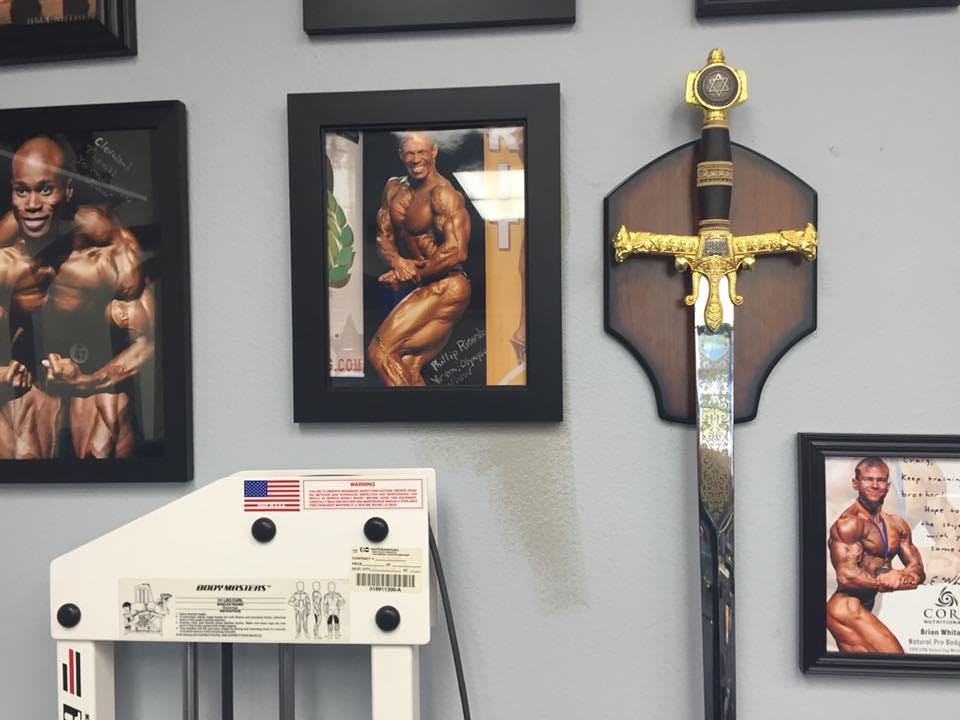
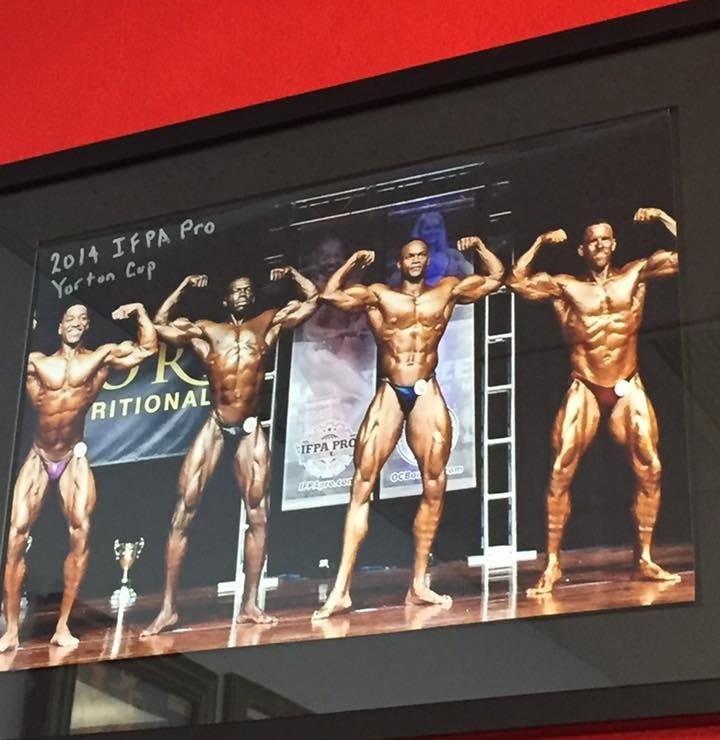
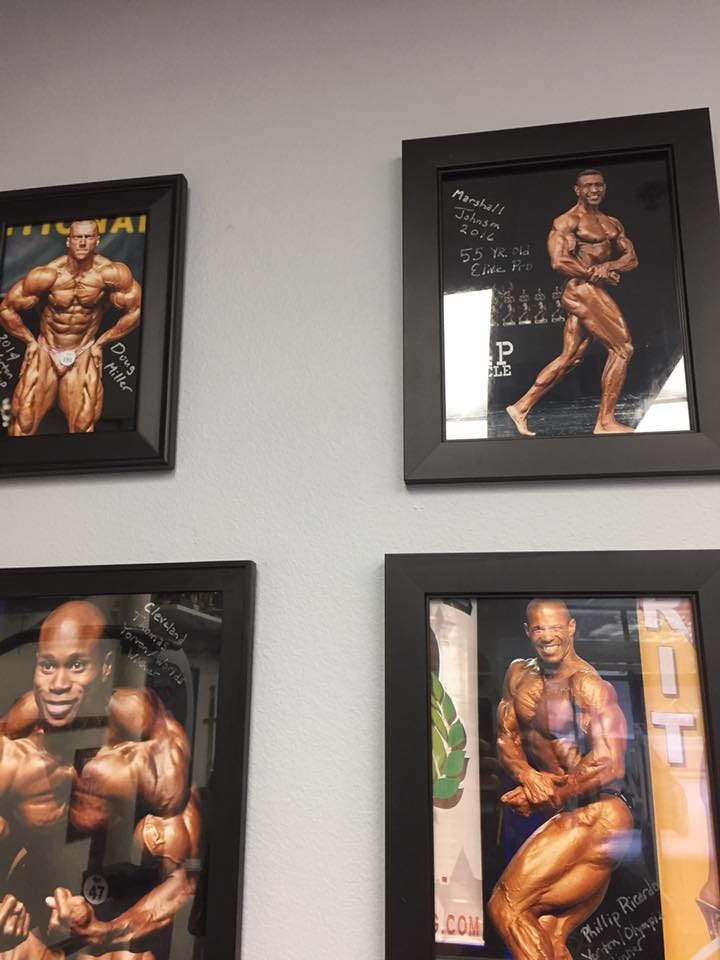
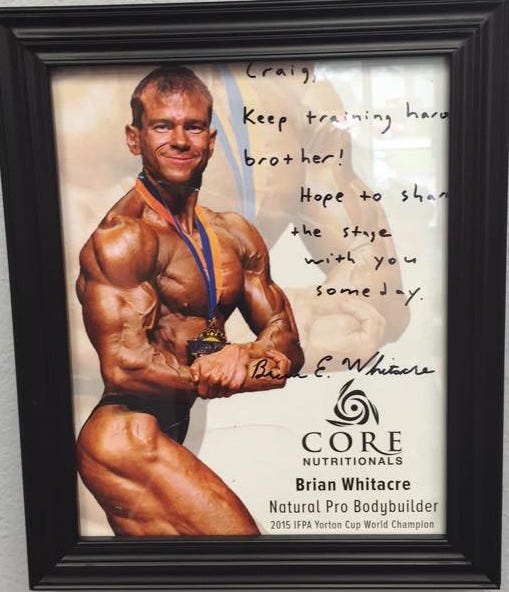
You're never going to convince me. I've never seen anybody that can match his symmetry and in his very best his conditioning was outlandish too. The package he brought was just absolutely phenomenal honestly and I think Philip would probably agree with me. I think he's better than Philip. It's just Philip in his prime, his conditioning was unmatched. He was just one step up. He was so phenomenal that you just couldn't not say yes to him. His legs were just so ridiculous, his Serratus and obliques, so ridiculous. His back's not the biggest, but Jesus come on like there's just nobody else that has the same thing shoulders. His shoulders were just not that big you know, they weren't, but it didn't matter because there were just things that were there that you've never seen before and I've never seen since. I just haven't. When he did that side chest and those hamstrings and glutes just
he really honestly to me he covered up a lot of flaws with one quality that was so overwhelmingly dominant, so to me he has to be the greatest natural bodybuilder even with the flaws I mentioned. He was an amazing poser too and he's just a phenomenal bodybuilder and he did it again and again for a long time. He didn't just do it once in natural bodybuilding to have a peak that's four five six years is a long time a long time, because you got to bring outstanding conditioning every time so to be in an absolute peak condition that many times is a big deal you know especially back then, it wasn't like now. Either you didn't take these long layoffs, so you did it year after year from 2007 to 2013. None of this two or three year off stuff happened. These guys competed over and over. I did too because I thought that was normal, now we were wrong. It wasn't the best physiological thing to do, we were wrong, but you got to realize when people can compete at a high level five six seven times a year, year after year, after year, man that's a Ken Griffy kind of drawing that the guys think now is just outlandish and I know that it's not the best thing and I could have probably developed a better physique over those years, but to maintain that level for that long is something you'll never see again because the guys just don't do it. They don't do it period.
Kenny: Amazing Craig, thank you so so much. I am truly grateful for your time, your story is truly inspiring. I mean I'm sure a lot of people will enjoy this for what it is and hopefully they take something that could help them with their journey
For those who made it this far, thank you so much for reading. If you would like to support the magazine and everything Longevity Muscle is aiming to do for natural bodybuilding, please subscribe.
You can also listen to the full episode with Craig here: Longevity Muscle
Craig Toth was Inducted in the NGA (National Gym Association) Hall of Fame on November 5th 2022. It ended, where it all started.
Craig Toth competed for the last time in 2022 in both the NPC & NGA, roughly 4 months after this interview & roughly 1 year before he passed away. A champion who will always be remembered. RIP Craig.
Article copyright © 2024, Longevity Muscle. All rights reserved. Craig Toth quotations that appear in this series for Longevity Muscle Magazine are courtesy of the Longevity Muscle Podcast

